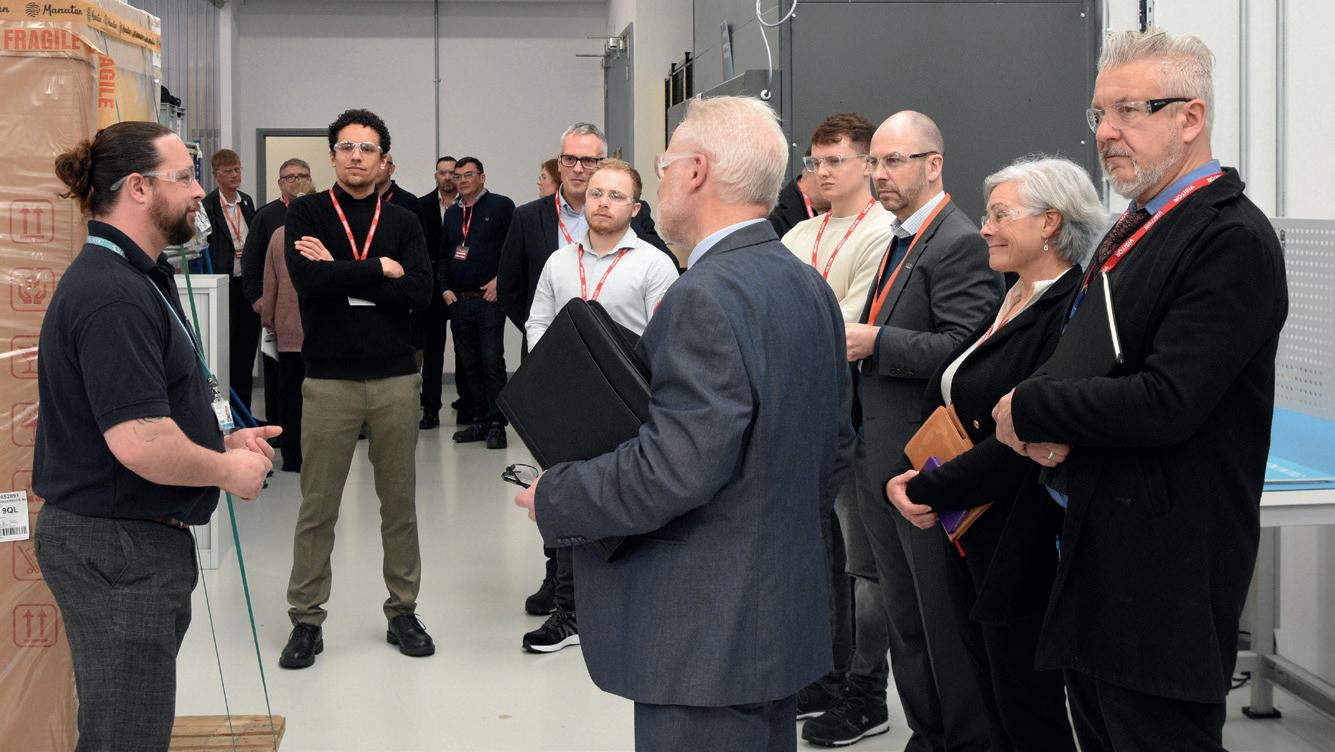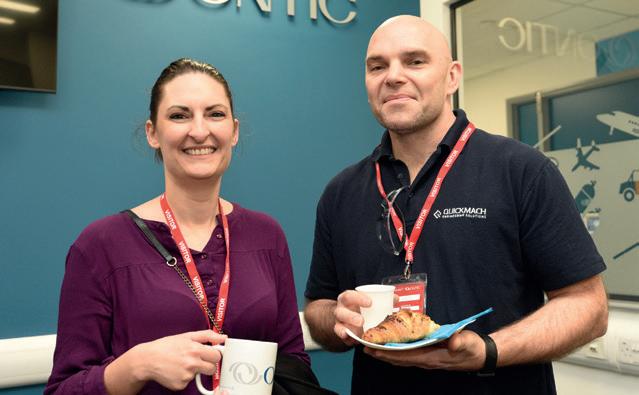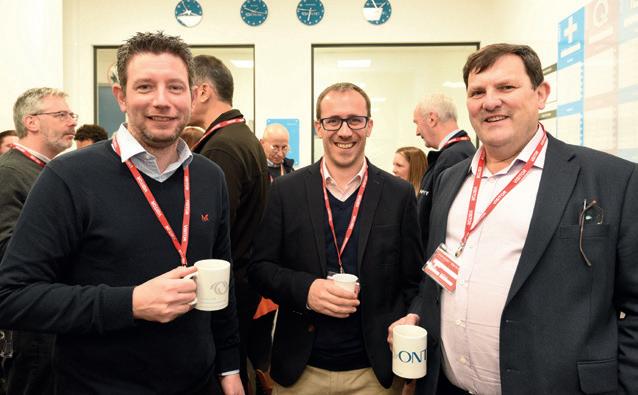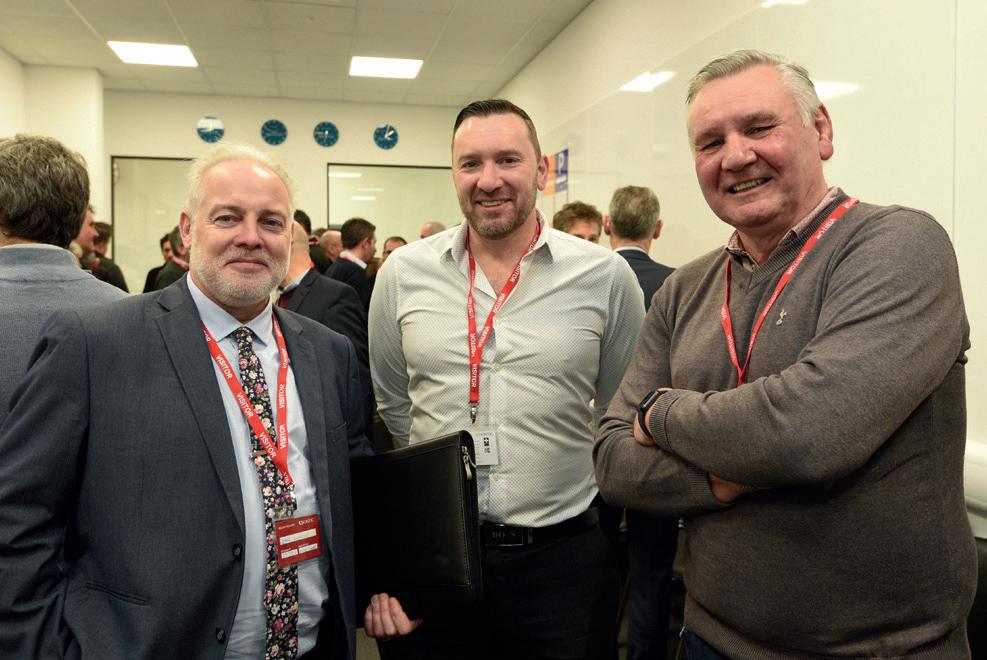




It might look rather like Business & Innovation Magazine, and that’s because it is – in all but name.
Our last issue in March was the final one to carry the title Business & Innovation Magazine, which we first launched in May 2017. After being acquired by Black Ox Ltd last year, we are now proud to adopt their magazine title as a regional publishing company which supports and reports on regional business.
Black Ox’s flagship title, The Business Magazine South East, covers business news from the Thames Valley, Surrey, Kent, Sussex, the Solent and the South Coast and has been published for more than 20 years. This issue covers the South West, West Midlands and Oxfordshire.
And the magazine is, as usual, packed with news, interviews and features.
In this issue, we pay tribute to King Charles III on his coronation. Our new king was, as Prince Charles, forthright in his views on many topics, not least of which was giving disadvantaged young people a helping hand. In 1976, after leaving the Royal Navy, he launched The Princes Trust. In 1983, the Trust set up its enterprise programme which has since helped more than 90,000 young people between 18-30 to start their own business.
In total, The Trust has helped more than a million young people to date and helps tens of thousands more across the UK each year. This is an amazing and ongoing initiative and you can read more about it in our Skills pages.
Our headline feature is Keep the Money Flowing. Where do start-ups, scale-ups and SMEs go to find growth funding?
We’ve interviewed some of the region’s most knowledgeable investors and explain
the range of funding options available to ambitious companies.
Our ambitious leaders in this issue are truly inspiring. We meet Fiona Shiner who, in just a few years, has established a hugely successful vineyard which is already winning international acclaim for its wines, and talk to Ross Morgan at Tokamak Energy, the company grappling with one of the world’s toughest physical challenges – achieving nuclear fusion which could provide the world with limitless energy.
Elsewhere in the magazine we put research and development under the microscope, attempt to explain quantum computing and reveal 10 of the region’s coolest technology innovations, from sustainable jet engines to a new electric car engine capable of going from 0-60mph in less than 1.5 seconds.
What all the innovators behind these new technologies did was never give up. We didn’t know until we started researching the topic that Sir James Dyson created
more than 5,000 prototypes before he succeeded in building his DC01 bagless vacuum cleaner.
As Thomas Edison, the 19th century inventor of the light bulb, was reputed to have said: “I have not failed, I’ve just found 10,000 ways that won’t work.”
Mr Edison also contributed to the invention of the phonograph and the motion picture camera. It’s not too grandiose a statement to say that this man changed the world. But little could he have known the global impact his innovations would go on to have.
This magazine is packed full of innovation, including a company making fuel out of chip fat to another developing sustainable construction materials and many more.
Their names may not be Dyson or Edison, but it’s likely some of their ideas and innovations will go on to have just as much an impact on society.
We hope you enjoy the read.
Kirsty Muir Head of Print and Advertising













Transport company William Gilder has revealed the future of UK truckstops.


The new truckstop at Teddington near Ashchurch, Tewkesbury opened in February, o ering a secure facility for the tens of thousands of lorry drivers who drive our highways day and night.
It’s a far cry from the truck stops of old – greasy spoon cafes o ering plates of cholesterol-busting fried foods with pints of tea on formica tables – and where domestic car drivers feared to enter.
According to the Road Haulage Association: “The state of lorry parking facilities is a national disgrace.

“Nowhere else in western Europe is there such ramshackle, unsafe and unhygienic provision for the basic human needs of lorry drivers.”
That’s no longer true in Gloucestershire. The Teddington truckstop, just o the M5’s Junction 9 and next to William Gilder’s head o ce, o ers drivers showers, laundry facilities, a bunkered fuel service – even a licensed restaurant which looks more like the fabulous Gloucester Services.
The development, which includes the company’s new head o ce, is estimated to have cost around £2 million.
Last year the government promised up to £100 million to help the HGV industry improve the UK’s roadside facilities, and this is the first of four truckstops that William Gilder hopes to build – others are planned for Evesham, Cirencester and Avonmouth near Bristol.
At last year’s announcement of the £100 million funding, roads minister
Richard Holden said: “Hauliers and drivers are critical to our economy. But for decades, our truckers have had a raw deal. I’m proud our government is providing match funding support to the industry to boost drivers’ welfare, safeguard road safety and make sure driving an HGV is an attractive career by providing the facilities and respect lorry drivers deserve.”
William Gilder Group Director, Mark Fowles, said: “Everyone relies on lorry drivers, but few appreciate how the goods get to where they’re needed, or the infrastructure required to support that. Other than truckstops, the alternative is often an open layby.
“We o er all the provisions and security; those services people don’t appreciate that lorry drivers need – but do.”
The new restaurant also has a large mezzanine floor which Mark hopes the local community will use.

“We are a family business and William Gilder, the founder, farms nearby,” added Mark. “We also plan to put our locallyreared beef on the restaurant menu.”
William Gilder started the business in 1985 as an agricultural contractor. Since then the company has grown to include road haulage, waste management and – more recently – development.
Oxford-based autonomous vehicle software developer Oxbotica is to collaborate with Google Cloud.
Combining Google Cloud’s cloud infrastructure with Oxbotica’s autonomous vehicle software, the partnership will help last mile-logistics, light industry and public transport, to adopt autonomous driving.
Oxbotica intends to develop, test and validate its technology using Google Cloud’s computing and data analytics products, along with improving its security using Google Cloud’s cyber-security technologies.
Gavin Jackson, CEO of Oxbotica, said: “Google Cloud is a global leader in cloud infrastructure, and using its technology and AI powered tools will strengthen our customer proposition.”
Thomas Kurian, CEO of Google Cloud, added: “The combination of Oxbotica’s leading technology and our reliable infrastructure, AI and data-enabled cloud platform has the potential to accelerate autonomous mobility in a variety of industrial use cases.”
In January Oxbotica, which was established in 2014, announced that it had raised $140 million to deploy its operating system for Universal Autonomy in multiple commercial and industrial domains around the world, bringing the total raised by the company to $225 million since it was established.
Oxbotica has a number of firsts to its name, including running the first UK autonomous trial airside at Heathrow Airport in 2018, the first autonomous passenger rides as part of the UK’s DRIVEN project in 2019 and leading Britain’s first multi-city autonomous vehicle demo, Project Endeavour, in 2020.
It has also seen investment from food retailer Ocado and German tech company Zahnradfabrik Friedrichshafen (ZF), among many other investors.

The Cotswolds is about to get a new events and wedding venue.
Warwickshire property development and investment company the Wigley Group will build and operate the new £2 million venue near Cheltenham at Naunton Downs Estate.
Planning consent has been granted on a 5,000 sq ft barn, and construction is set to start this year.

It follows National Hunt racehorse trainer Ben Pauling’s purchase of the 200-acre site last April, which includes a golf course and dining, entertainment and retail venue. The joint venture will also invest £300,000 to upgrade the existing venue and golfing facilities.
Ben said: “The existing dining and entertainment venue and Fitzdares Club are well-established and we believe there is significant potential for a luxury venue in this location that can cater for a wide range of events – personal, business and racingrelated.”
Chief Executive O cer, James Davies, said: “We have got to know Ben and his wife Sophie really well over the last few years and can see the potential that Naunton Downs presents.”
“Hauliers and drivers are critical to keep our economy motoring. But for decades, our truckers have had a raw deal when it comes to decent roadside facilities”
The BBC’s Repair Shop is inspiring similar projects all over the UK.
Worcestershire business
Morris Commercial has joined the race started by Volkswagen’s ID Buzz to bring retro cargo vans to market.
The start-up, based at Hinton-On-TheGreen, is reviving the iconic 1950s Morris J-Type van. With a multi-millionpound funding round completed, Morris Commercial says it should have cargo vans on the road by next year.

The Morris JE electric van draws inspiration from the iconic Morris J-Type, arguably one of the most recognisable vans of the 1950s and combines modern battery technology and lightweight carbon-fibre construction with classically inspired British design. Most components of the Morris JE are recycled and recyclable.
Substantial funding and resources have already been invested to bring the Morris JE from concept to a production prototype.
The funding will enable Morris Commercial to recruit further expertise, and strengthen its partnerships with core suppliers. Morris Commercial expects that deliveries of the Morris JE will begin in early 2024.
Dr Qu Li, Chief Executive O cer of Morris Commercial, said: “With this new investment, we will be able to accelerate product development and take the Morris JE to market. I am very excited about the future for Morris Commercial and look forward to delivering our iconic van to our many thousands of pre-registered customers around the globe.”
Bristol and Wiltshire firms are celebrating after claiming titles at the FSB South West Small Business Awards.
The UK’s first women’s urinal business snagged two titles. Peequal, set up by Bristol University graduates Hazel McShane and Amber Probyn, won both the best Business and Product Innovation prize and the best Start-Up award.
Devizes-based chartered accountants Charlton Baker scooped the FSB Larger Small Business title, Swindon’s Top Professionals Access Limited won the new Diversity and Inclusion award, and Dan Yates from Warminster-based
Greener won the Young Entrepreneur title.
It was the second consecutive year that the FSB Young Entrepreneur accolade had come to Wiltshire following the success of gardener Alfie Jones, of Royal Wootton Bassett in 2022.
For Peequal, the awards are the latest boost to their growing business which has captured widespread national media interest and already seen the company’s unique women’s urinal in operation at a number of key festivals including Glastonbury, Wilderness, Green Man and Shambala.
The latest is a repair café which is opening at the University of West England’s Frenchay Campus this year, following nearly £90,000 funding from the Royal Academy of Engineering.
Engineering students are setting up the MAKERS project (Making and Knowledge Exchange for Repair and Sustainability) to improve representation from women and people from Black, Asian or Minority Ethnic groups, alongside those from under-represented backgrounds.
Working alongside community groups from Easton, Eastville and St Paul’s, which have established similar schemes in their areas, the café is hoping to open in the university’s School of Engineering in October.
Using UWE Bristol’s engineering equipment, the project will help solve problems and fix broken goods, upskilling those involved in the scheme and supporting the circular economy. The repair café will run until May next year and will build on UWE Bristol STEM partnership projects in the city.
Dr Laura Fogg-Rogers, UWE Bristol Associate Professor for Engineering in Society, said: “At a time when so many are struggling to make ends meet, MAKERS will help by giving new life to valued things; make new friendships between the University and Easton; and remove things from landfill. A real, living, example of the circular economy where it’s needed most.”

UK start-ups raised $30 billion last year. While that’s a drop from the peaks of 2021, it was still 72 per cent higher than the 2020 total, according to Tech Nation in its last report. But with the landscape for investment funding tightening, can businesses still attract investment?
By Nicky Godding, EditorWith the very public demise of the USA’s Silicon Valley Bank in March, and many global technology firms resizing downwards after their pandemic boom, does this mean it’s more di cult for startups and scale-ups to raise the funds they need to grow?
Almost certainly. But for entrepreneurs completely invested in their technology innovations, while it may take a bit longer to raise the funding – seasoned and patient investors haven’t lost their appetite for a well-researched and developed idea which has real world benefits – look at the growing appetite for investment in fusion (see our interview with Tokamak Energy elsewhere in this issue).
According to the British Business Bank’s Finance Markets Report 2023, lending volumes grew in 2022 with challenger and specialist banks accounting for a record share of gross lending. But there are increasing signs of di culties in accessing finance, the report’s authors admitted.

And finance to support innovations are essential to deliver the long-term economic growth the country needs, it added.
The bank’s March SME Finance Survey revealed that gross bank lending increased by almost 13 per cent in 2022, but net lending fell by £8.5 billion in large part reflecting the repayment of Covid loans.








For the smaller business equity finance market specifically, investment activity has slowed considerably since Q3 2022.
Recent years have seen larger equity deal sizes and increased company valuations but in recent months investors have re-evaluated their positions leading to smaller deals and lower valuations.
So what are investors buying into?
Green innovation, according to the report, with net zero deals outperforming the wider equity market. These deals currently make up 12 per cent of all smaller business equity deals compared to only five per cent in 2018, and deal values are rising even faster. The investment value of net zero-related deals rose by a hefty 184 per cent over the past year, soaring to a new record level of £1.7 billion.

Innovative businesses are more likely to use some form of external finance (65 per cent versus 58 per cent of non-innovators, according to the British Business Bank’s report). Smaller businesses seeking finance to innovate are also reported to be using a wide range of finance products, with many smaller businesses opting for grant finance, asset finance or bank overdrafts to help them develop and adopt innovative products and processes.

However, the availability and cost of finance remain significant barriers to innovation.

Science Creates is a Bristol-based deep tech ecosystem including two incubators and a venture capital investor which helps scientists and engineers commercialise their scientific discoveries. It was launched around seven years ago by Dr Harry Destecroix, who sold his biotech start-up, Ziylo, to Novo Nordisk for up to $800 million in 2018 (he was just 31 one at the time).
In partnership with the University of Bristol, Science Creates now combines specialist incubator facilities (which include laboratories, o ces, event space, deep tech and finance mentors) across two sites in the city with a dedicated venture capital fund.
Despite his eventual success in selling his business, Harry originally struggled to raise money and had been turned down by venture capital investors. He didn’t want that to be a barrier for other promising businesses in Bristol which at that time had almost no venture capital sector, and few spin-outs from its universities.
So he founded Science Creates. Just a few years later, the university is sitting comfortably in the UK university top 10 for spin-out companies.
Dr Catherine Fletcher, who did her PhD in Synthetic Organic Chemistry at Bristol, is principal at Science Creates Ventures.

“We invest in deep tech and encourage and enable scientific founders to become entrepreneurs. We are founder-friendly, but we also want them to understand where their skillsets lie. If they want to become their new company’s chief executive, then we will support them. Equally, some prefer to take a chief technology o cer or chief scientific o cer role, remaining close to their technology where most of the focus needs to be at the early stage.”
For Catherine, there are three main elements to commercialising innovation and making it attractive to potential investors: the technology, the team behind it and the potential product.
“What you will often hear is, if the right team has an idea and it doesn’t work, a great team will make it work. And if you are in a sector such as software as a service, that may well be true. But at Science Creates we are talking about deep tech, about layers and layers of research and development in wide-ranging areas from bio or agri-tech to engineering, and where perhaps years of research has finally resulted in the securing of intellectual property on the idea.
“If you have proved your technology works, and there is a need or appetite for it, then you want the right person driving the business’s development, and that might mean bringing expertise in from outside.”
She also warns about taking a product to market too early.
“In deep tech things need to be done di erently,” says Catherine.


Start-ups in the deep tech sector risk being shoehorned into a route to market when they haven’t fully explored the full scope of their technology. Investors, who perfectly understand market risk, can encourage start-ups down the market route too early.”
“We say: if a founder spends longer de-risking the technical part, they will have a better understanding of the limitations of the technology and what the first product should be, then the market risk is reduced because they will be more likely to deliver. This results in a product with a much better market fit.
If you lock in your product too early and take it to market, it’s more di cult to adapt and more likely to fail.”
This is a tough strategy to follow with few enough early-stage investors, but most deep-tech investors understand the long time horizons to market, although there are always opportunities for early exits for the best companies.

Science Creates Ventures invested in five companies last year. Nebu-flow is developing the next generation of nebulisers; Open Bionics continues to successfully develop its prosthetic Hero Arm; Scarlet Therapeutics is applying advanced genetic engineering to red blood cells aiming to transform them into new treatments; IsomAb is taking a di erent approach to developing isoform specific antibodies to treat diseases with limited treatment options and Kelpi is harnessing the novel properties and environmental benefits of seaweed to replace single-use plastics with bioplastics.
In the last year alone, these companies collectively raised more than £25 million.
“We don’t invest in unproven ideas, we invest in IP,” added Catherine, “most of which have been developed by university spin-outs.”
Entrepreneurs and founders of start-ups who network and take advice both o ered and asked for are more likely to secure investment and become successful than those who don’t.
You can’t be an expert in everything.
So says Richard Cooper, managing director of Oxford Innovation Finance, the home of OION (Oxford Investment Opportunity Network), one of the oldest and largest angel investment networks in the UK, and the Oxford Innovation EIS Growth Fund.
One of the biggest problems, he says, is when entrepreneurs or founders of startups are looking for funding, they don’t always think like an investor.
“There is a definite weakness in fundingraising for the pre-seed phase of a business,” he says.
Pre-seed funding is the investment round which comes when a start-up needs funding to develop their idea into revenuegenerating businesses.
In the past, this round of funding was often achieved through angel investors, family and friends, but in recent years early-stage investors have seized the opportunity to invest. Now, however, such investors are fewer and further between.
“A lot of founders think their technology or science is absolutely brilliant – and so they should. But angel investors in particular are usually generalists and won’t always understand the detail,” said Richard.

Spending a five-minute pitch introducing their technology might seem like time well spent to a founder, but an investor wants to know how the company is going to grow, the capabilities of its management team and the business model.
“While I can totally understand why founders do this – I used to run a software company myself and was so excited about the tech I was developing that I wanted to tell everyone. But a potential investor needs to understand the bigger picture, and that can be quite hard to do. A founder needs to describe how they are going to grow the business and how an investor can exit.”
Oxford Innovation Finance has a large angel investment group of around 670 members. And while Richard admits that investment rounds are taking longer for everyone, thanks to the current di cult economic climate, his organisation hasn’t seen a big downturn in investments because not all angel investors have been a ected.
What can a start-up do to secure the funding they need to get their ideas o the blocks?
Contacting Innovate UK to apply for a grant is a good first step. And while such grants are not handed out like sweets (this is government funding after all), if a start-up business has a good idea and is willing to put in the time to explain and justify it, they are more likely to be successful.
And if it’s good enough for Innovate UK backing, this will help fuel investor confidence.
Potential investors will need to understand the traction of a business. For instance for a software company, it’s all about revenue. For a bio-tech or health-tech it’s about early trials.
Richard also advises founders to try and raise more than they need, because it’s incredibly time-consuming to have to start fundraising again within six months when they should be focusing on product or technology development.
“You need to raise enough for 18 months
Founders and entrepreneurs should take advice if they want success, because you can’t be an expert in everythingRichard Cooper, managing director of Oxford Innovation Finance. Photograph by Tricia de Courcy Ling
so that you have a runway on which to build the business.

“I understand that some founders don’t want to give away equity early on – that approach works in boom times, but not so well in our current economic situation. In the long-term, raising more earlier will work better for the business.”

The strategically-thinking founder will be planning all equity funding raising rounds from the beginning. “This approach gives an investor confidence,” says Richard. “While an investor understands that a start-up is likely to have to adapt to circumstances and there will be hurdles along the way, at least they will understand about dilution levels – and it’s better to show you have a plan than no plan.”
Richard adds that investors will also look at how a management team copes with inevitable challenges. “New tech can be brilliant, but if it’s really innovative, there are likely to be issues to overcome. How a management team reacts to those is the di erence between a good technology company and a mediocre one.”
When working with a start-up seeking investment, Oxford Innovation Finance will

advise them on building the right team, including finding a leader with the right experience to help build the business.
“We usually have a board observer on a company in which we have invested. They will share their industry knowledge and advise on what’s worked before and what hasn’t.”
Oxford Innovation Finance invests in technology and business-to-business and its sweet spot currently is the second and third round of funding, pre-series A. While the business is based in Oxford it does invest nationally.

“We will often get a batch of certain companies in one sector, and it can be very hard to pick and choose, which is why we advise founders to network and find mentors and advisers.
“Start-ups don’t start their business because they love finance and raising money,” said Richard.
“They start their businesses because they are passionate about building a company to meet a real need in the market.

“If they are not educated in how to raise funding, that’s di cult. There is some education going on, and over the last five or six years the quality of companies coming through has improved, but we need to cement that.”

Last year Richard and his team saw a lot of founders presenting technology in the mental health space. This year there is a lot of green-tech.
Innovate UK’s Edge programme is particularly good, he says. “Founders can pitch, and we can give high-level feedback. It’s a really good initial education.”
“Start-ups don’t start their business because they love finance”
“I understand that some founders don’t want to give away equity early on – that approach works in boom times, but not so well in our current economic situation”Oxford Innovation Finance participated in a £4.1 million funding round in Anaphite last year, which is enhancing Li-ion batteries with graphene, to help power the sustainable energy revolution
According to data company Experian, in spite of high inflation, rising energy costs and other economic challenges, around a quarter of UK small and medium-sized enterprises remain resilient – making them “good risk” prospects for lenders. The challenge for would-be lenders will always be how to di erentiate between those which are a good credit risk and others which may be less able to meet their financial commitments over time.
From bank loans to private equity, angel investment or crowd-funding, there are many di erent types of borrowing, or ways a business can raise investment to drive a long-term strategy or to manage shorterterm cash flow challenges. But start-ups or scale-ups seeking to raise money should proceed with caution and always take expert advice.
The most widely used form of finance used by UK businesses.


A business borrows a sum of money, either as a loan, or (generally more expensive) an overdraft and pays it back over an agreed period of time.
There are additional forms of debt finance. Two of the most widely-adopted are finance secured on assets and factoring.
Asset finance (leasing or hire purchase) can be ideal for businesses seeking help to buy expensive assets, without using funds earmarked for cash flow.
Factoring turns invoices into working capital. A business sells its invoices to a third party (a factoring company) at a discount. Invoice factoring can be provided
by independent finance providers, or by banks.

Capital is invested into promising startups or small businesses in exchange for equity. Funding such as this usually comes from wealthy investors, investment banks or other financial institutions looking for opportunities to support young companies in the hope that early investment will help them grow faster, making money for the investor and the founders. The financial investment may come with managerial or technical support.
Venture capitalists will often invest in a number of small companies, taking around 50 per cent equity in the business. This helps them spread their risk, and often allows the business founders to retain equity in the business so that its success will also deliver for them as well as their investors.

This is a way for young companies to secure financing without giving up equity or having the burden of inflexible debt repayment conditions.
Investors agree to invest capital in a company in exchange for a percentage of the company’s ongoing total gross revenues. It is an alternative investment model to more conventional equity-based investments, such as venture capital and angel investing, as well as debt financing.
It means a young company can raise capital without sacrificing part of its equity or pledging a part of its assets as collateral.
Private equity investors take shares in a business. Like venture capital, the investors are generally high net worth individuals, or large institutional investors, such as pension funds or companies acting on their behalf. The goal of private equity investors is generally to take control of the whole business and so they usually invest in mature or proven businesses which the investors feel have fundamentally good products or services but have unrealised potential because of poor management or other ine ciencies.
High net worth individuals (“angels”) who are willing to invest their own funds.
Angel investors seek to share in the successful growth and have a return on their investment. However, angel investing is generally regarded as “patient capital” (an investment made for the longer term), and they may not see an exit or a return on their investment for up to eight to 10 years.
While business angels can invest on their own, more frequently investment is made alongside other angel investors through syndication. This enables them to pool funds and share the risks.
There is a regulatory framework for angel investing that protects angels and the entrepreneurs.
Before receiving business plans or beginning to make angel investments, an angel investor must self-certify as either a High Net Worth or Sophisticated Investor.
A certified high net worth individual must have a net income in excess of £100,000 or net assets in excess of £250,000 over and above their pension fund assets and private residence.
A sophisticated investor must have either been a director of a company turning over at least £1 million within the last two years, have made more than one investment in an unlisted company in the last two years, be a member of a network or syndicate of business angels for at least six months or have worked in the past two years professionally in the private equity sector or in the provision of finance for small and medium enterprises.
The government’s Enterprise Investment Scheme (EIS) and Seed Enterprise Investment Scheme (SEIS) give angels generous tax breaks. By making investing less risky for investors, the schemes help businesses grow.
Under EIS, angels cannot take more than a 30 per cent share of a business, which makes sure that entrepreneurs stay incentivised.
Not strictly borrowing, because they don’t have to be paid back, grants from government are often di cult to find and sector specific. Application forms are also often time-consuming to complete. Contact the government’s innovation agency, Innovate UK, which operates many funding schemes.
The value of grants varies greatly but can be between £1,000 to £100,000 for small or medium-sized businesses, or much larger for the high growth businesses that the government wants to encourage.
Raising capital through collective funding of individual investors. These can be friends and family or, increasingly, amateur investors or individuals seeking opportunities to invest their money via online or social media platforms.
Crowdfunding platforms, such as Crowdcube or Seedrs, o er a public arena to showcase a business’s products or services. There are di erent sorts of crowdfunding websites, including rewards-based where the investee o ers their product or service as a reward, equity-based where the investee gives up a portion of the business to the investor, or donation-based – often used for social enterprises or community interest companies.

Peer-to-peer lending matches up potential investors with borrowers, who could be individuals or businesses.
They appeal to investors willing to take on more risk with their cash for higher interest rates o ered than typical savings accounts.
Retail investors access an online platform to provide loans to consumers or small business borrowers. These platforms facilitate the lending, undertake credit assessments and other risk management, but do not act as a counter-party to the loan, and contracts are direct between the investor and the borrower.
In 2019, the Financial Conduct Authority imposed stricter rules for peer-to-peer platforms to protect less experienced investors. One of these rules was the introduction of a requirement that platforms assess investors’ knowledge and experience of peer-to-peer investments where no advice has been given to them.

“Crowdfunding platforms, such as Crowdcube or Seedrs, offer a public arena to showcase a business’s products or services”Abingdon-based EcoSync raised more than double its £400,000 Crowdcube target to further develop its smart tech to enable those managing commercial buildings to stop heating empty rooms Carbon Gold, the Bristol-based organic, peat free planting aid business founded by Craig Sams, (who also founded Green & Blacks Chocolate], smashed its £200,000 Crowdcube funding target earlier this year
Although concerned that the UK is becoming a harder environment to scale in, nine in ten of the UK’s scaling companies expect to continue growing in the coming 12 months.
One in five expect to scale at 50 per cent or more. These insights were revealed in the ScaleUp Institute’s 2022 Annual Review, which also recorded
a strong scaling pipeline and a 13 per cent increase in the number of ‘visible’ scale-ups to 8,457 – which it defines as those breaking through the £10.2 million turnover barrier or £5.1 million in assets. That is a 119 per cent increase since these were first tracked in 2017.
The report included a survey of more than 300 chief executives of

high-growth scaling companies across the UK with a combined turnover of £2.5 billion.
Almost 40 per cent of the scale-ups surveyed have a female or ethnic minority founder or chief executive. More than 60 per cent want to export more this year and more than half expect to raise further funds to fuel growth.
Fifty of the UK’s leading women entrepreneurs – including a number from across our region – have been backed by Innovate UK for game-changing ideas.
From a pedal-powered games controller to an AI digital prehabilitation programme for cancer patients before receiving treatment, Innovate UK’s Women in Innovation Awards will empower the women to scale their innovative businesses.
Each winner will benefit from a £50,000 grant, one-to-one business coaching, networking opportunities, role modelling and training.
The Awards reflect the government’s ambition to give more support to women innovators and business leaders.
The entrepreneurs include Sarah Nicolls, from Stroud, founder of Future Piano and concert pianist, who is revolutionising the design of grand pianos with her lightweight, portable yet totally acoustic “Standing Grand”. This innovative product fits in modern homes without compromising on sound while reducing the weight and carbon footprint of a normal grand piano by 60 per cent.

Another entrepreneur is Samantha Payne, from Bristol, who co-founded Open Bionics, a robotics company building multi-grip bionic arms for amputees, which are 3D printed to make them more a ordable. Disney granted the company royalty-free licence agreements, enabling them to produce prosthetics based on fan-favourite characters like Black Panther, R2-D2 and Iron Man. A “Sidekick” app syncs the arm to the phone for personalisation, training and tracking performance.
Dr Rebecca Allam, also from Bristol, is a haematologist who has founded PreActiv, a ‘prehabilitation’ programme using the time people have before a cancer treatment to better prepare them for it. Her innovative
AI-led digital platform creates personalised programmes from the time of diagnosis potentially reducing the risk of complications by 51 per cent, cutting down hospital stays by a third and allowing quicker recovery.
Laura Scanlon, again from Bristol, cofounded Fatima, a research platform that ensures data is ethically collected, securely stored and rapidly analysed. This helps organisations looking to have a greater social impact to better understand the challenges of and to reach vulnerable people who are often overlooked and mistreated, and their data used without their consent or knowledge.
Emma Heathcote-James from Worcestershire founded Little Soap Company in 2008. Since then the business has expanded to four full ranges, with 30 key lines in all the main chemists, supermarkets and online giants. As well as selling kind, quality products, each bar replaces an unnecessary plastic bottle, tub, pot or tube. The company obtained BCorp status in 2020 and all its products are vegan, cruelty free, RSPO Palm, and made in the UK.
“There is currently no option of truly sustainable, plastic-free products in this category in UK supermarkets or chemists,” she said “Seventy five per cent of market share is from just three major players – all using plastic packaging. Quite simply we will shake up what is currently a very unsustainable and un-eco category.”
Innovate UK, the country’s innovation agency, provides funding to help stimulate innovation in the UK economy. It encourages businesses to work with other commercial and research organisations.
Innovation is never easy, especially in the early stages of developing an idea before taking it to market. Sometimes businesses might need to work together, supported by a research and technology organisation which can lead the project.
The level of funding available from Innovate UK to develop innovation will depend on the size and type of the organisations applying (either businesses, research organisations, public sector organisations or charities undertaking research) and their role in a project. Organisations fall into three categories: businesses, research organisations and public sector organisations or charities undertaking research. Businesses applying must be registered in the UK.
There are dozens of open competitions on its website, which are being added to regularly. Here are some of its latest. More details on all of them, along with all other criteria around funding applications (and there are many) can be found on www.ukri.org. A word of warning – beware of the tight opening and closing dates.

The University of Warwick has joined forces with seven other research-intensive Midlands universities to form an investment company for early-stage technology businesses.
Midlands Mindforge plans to raise up to £250 million from institutional investors, strategic corporate partners and other qualifying individuals.
The Midlands Innovation partnership also involves the Universities of Birmingham, Cranfield, Keele Leicester, Loughborough, Nottingham and Aston.
Together, they will aim to support fledgling businesses in sectors such as clean technology, AI and computational science, life sciences and health tech.
Professor Trevor McMillan OBE, Chair of the Midlands Innovation Board and Vice-Chancellor of Keele University, said:
“We have one of the largest research communities in the UK, with more than 14,500 academics who have a strong track record collaborating on innovative research
ideas that turn spin-outs into successful businesses.
“This new company creates an ecosystem to better support our research entrepreneurs and encourage innovation. By cultivating an environment where post-graduate students and researchers with commercial ideas can benefit from early access to investment, we can create opportunities for our people, place, and partnership to flourish.
“Midlands Mindforge will allow our universities to scale up their research and enterprise activity. It is a catalyst for building ground-breaking businesses that help to boost economic growth, create highly skilled jobs, and support the UK’s bid to be a global science and technology superpower.”
Compared with other UK university groupings, Midlands Innovation shares the most post-graduate students, the highest levels of annual income, and the most research disclosures and patents generated per unit of research spend in the last three years.


Toddle Born Wild, a baby skincare brand which last year secured £60,000 from two of the BBC’s Dragons, Deborah Meaden and Steven Bartlett on Dragon’s Den, has landed a finance package of £26,000 from HSBC.


The funding from HSBC UK’s Green SME fund has been used to develop more sustainable packaging with assistance from sustainable plastic research from the University of Wrexham.
Toddle Born Wild was founded by former
Ecoversity UK, a Community Interest Company developing the industrial hemp sector, has joined the Hartpury Tech Box Park to support local farmers in exploring the many uses of hemp.
Lydney-based Ecoversity UK Chairman Marcus Morley-Jones, said: “Hemp is a multifunctional premium cash crop, so versatility is a word you’ll hear a lot about growing this plant. What this means for the farmer is that ample amounts of food, fuel and fibre can be harvested in a single rotation – which also functions as a powerful carbon sink and natural soil conditioner.
“We’re seeing the plant reappear increasingly more in our diets, clothing and even in our construction materials. However, most businesses have no option but to import such products as UK farmers struggle to source a viable and scalable processing solution to meet demand. Here is where putting resources into education can help de-risk the supply and value chain, to enable local farmers and businesses to successfully test the crop as part of a local circular economic system.”
RAF o cer Hannah Saunders after she struggled to find suitable products to protect her child's skin from outdoor weather.
Thanks to the expertise of Deborah and Steven, the business expanded into the USA, where it sold out in six weeks. The HSBC funding will also help the business expand through new job creation, sourcing materials from UK suppliers and moving into new headquarters in Staunton, Gloucestershire.
Gloucester City Council has signed a deal with IHG Hotels & Resorts for a 131-bedroom Hotel Indigo at The Forum development in the city centre.
The deal sees the city welcome its first international upscale hotel brand as an anchor occupier in the £107 million project, which is being developed by the council in partnership with Reef Group.
The Forum is part of an ambitious programme of regeneration under way in the city centre and a central part of the council’s King’s Quarter regeneration, which will deliver two acres of pedestrianised public space.
This includes the £5 million transformation of King’s Square, which was o cially launched in April 2022.
The Hotel Indigo brand, part of IHG Hotels & Resorts, has hotels in cities all over the world including London, Berlin, New York, Hong Kong and now Gloucester.
Gloucester-based AIS (formerly Advanced Insulation Systems), a global leader in the design and manufacture of insulation and passive fire protection systems, has been awarded a substantial contract to provide its ContraFlex advanced insulation jackets for a FPSO – floating production storage and o oading –vessel in Brazil.
The contract was awarded by a Japanese company operating in Brazil.
The contract includes 400 sq m of thermal insulation for valves, flanges
and pipes. It also includes the installation of all jackets after delivery.
This is AIS in Brazil’s first substantial order for thermal insulation for o shore applications.
The jackets will be installed in the Brazilian pre-salt area, in the Santos Basin. The FPSO – which produces crude oil and gas at sea – is capable of processing 150,000 barrels of oil per day, 280 million standard cubic feet of gas per day, and has a storage capacity of 1,600,000 barrels of total fluids.
Hartpury University and Hartpury College is a specialist education provider in the heart of Gloucestershire, home to over 4,500 students studying PhDs, postgraduate and undergraduate degrees, and diplomas in sport, equine, animal, agriculture, veterinary nursing and A-levels. In addition to education and training, Hartpury has built a strong reputation for its close ties with business and the community.
Transform your business with a Knowledge Transfer Partnership (KTP) Hartpury University has recently been successful in its application to join Innovate UK’s Knowledge Transfer Partnership (KTP) programme.

KTPs connect forward-thinking businesses with the UK’s world-class knowledge bases to deliver business-led innovation projects. Taking part in a KTP with Hartpury University can benefit your business by helping to solve a specific challenge that you may be facing. You can access academic expertise and resources that you don’t have in-house, and the projects are part-funded by an Innovate UK grant.
Working with Hartpury University, you’ll potentially improve your business processes and performance, while also becoming more competitive and productive. Hartpury’s population of postgraduate students is brimming with talent, ready to help.

In addition, a Knowledge Transfer Partnership with Hartpury could help your business to:
• Embed expertise and generate new knowledge including through upskilling and training your own workforce, expanding capabilities, and fostering a culture of innovation.
• Access the latest technologies led by university academics and students in Hartpury’s state-of-the-art facilities, applying them to your daily business practices.

• Gain privileged access to a world-class knowledge base and resources including academics actively engaging in global research projects.
• Increase revenue through access to new markets, comprehensive networking opportunities and new product development.
• Improve profits through e ciency gains, increase productivity and improve processes.
• Test new products and ideas before taking them to market, making investment or securing additional funding.
• Gain a competitive advantage by using enhanced intelligence to truly meet the needs of your customer base.
For more information, contact Jane Williams, Head of Research at Hartpury via jane.williams@hartpury.ac.uk.
Stuart Emmerson has been Director of Business Development at Hartpury since 2019 and has led the growth of a team that has been instrumental in securing innovative, positive partnerships and an outward-looking approach. An instinctive collaborator, Stuart’s belief that success is more impactful when it’s shared, has been carried through to a range of partnership and funding successes.

“Hartpury has so much to o er the business community, local government and the third sector. It’s been truly rewarding to see our impact and partnerships evolve and grow in recent years,” says Stuart.
“We have so many fantastic success stories of collaborative e orts and I’m committed to building on this in the years to come. Working with our outstanding local, regional and national partners we’re set on futureproofing and positively impacting the industries we’re passionate about.

“It’s great to see the success and benefits that can be enjoyed through joinedup thinking between business, local government, our leading academics and our talented student population.”
Businesses can get involved with Hartpury in a number of ways. These include:
Live student projects and consultancy
Hartpury’s Sports Business Hub is a strong example of an initiative designed to link business with a postgraduate student to carry out a live consultancy project.
Placements
Providing a placement opportunity for a Hartpury student comes with a variety of benefits. Not only will your business have additional resources and fresh thinking, but you’ll also tap into the specialist skills and knowledge they’re gaining as they progress with their studies. Who knows, your placement student could even become a future employee.
Graduates
Hartpury graduates enjoy high levels of employability so why not access an unrivalled pool of graduate talent to fill your next vacancy, also developing their knowledge and skills to make a di erence in your industry.
Collaborative Research and Development
Hartpury academics frequently engage in global research projects with industry partners.
Mix business with pleasure
Hartpury enjoys an enviable reputation for having produced more than 250 elite athletes and has invested heavily to develop its sport facilities over the years. The institution is home to ten elite sports academies that support students to compete regionally and nationally.
Hartpury’s commercial equestrian centre is also well regarded, hosting a busy calendar of competitions each year. The events are a great day out for all the family as well as a refreshing outdoor escape for businesses seeking a unique company away day.
GET INVOLVED: SPONSOR
Why not place your brand front and centre, by sponsoring one of Hartpury’s elite

The Tech Box Park currently o ers FREE dedicated, practical working space and support packages for selected start-ups and businesses looking to accelerate routes to market through testing, researching and developing new products more successfully.
The Agri-Tech Centre is at the forefront of the agri-tech revolution. Working with industry partners, Hartpury is helping to develop new solutions to some of the biggest challenges facing the sector including climate change, food security, animal welfare and productivity.
The centre is an ideal base for research projects exploring the potential of new innovations in agriculture including the use of drones for crop monitoring and management, exploring the potential of robotics for livestock farming, and developing new techniques for sustainable food production.
A word from Prof Andy Collop Vice-Chancellor, Principal and CEO of Hartpury University and Hartpury College

“At Hartpury, we’re passionate about fostering a culture of problem-solving, learning and innovation. The synergy
The Hartpury business development team has enjoyed great success in securing funding to help with research projects. Teaming up with Hartpury could help your business more successfully secure joint funding opportunities.

sports academies, teams or equine events?

GET INVOLVED: SPECTATE
If you’re still unsure whether to sponsor a sports team or an equestrian event, why not attend as a spectator instead? Matchdays are a good choice of familyfriendly entertainment or a corporate evening out.
To learn more about corporate tickets and hospitality as well as partnership packages, contact James Forrester, Hartpury’s Head of Sponsorship and Business Engagement via james.forrester3@hartpury.ac.uk.
Watching sport at Hartpury isn’t just fun and a ordable, it also provides an opportunity to catch up with your peers, unwind in the fresh air or network for new business.
T: 01452 702796
E: stuart.emmerson@hartpury.ac.uk
W: www.hartpury.ac.uk
between Hartpury and business creates an ongoing cycle of progress and growth for all involved, helping business to access the latest research and talent but also ensuring our degrees, diplomas and other academic programmes are aligned with the needs of industry.”

The week after the 2023 Cheltenham Festival and tailor Tom Wharton looks surprisingly relaxed considering he dressed more than his fair share of wellheeled racegoers.
“It was manic in the weeks before,” he says. “We were getting calls from those who wanted something almost at the last minute. But it doesn’t matter how much money they were prepared to pay – you just can’t rush good tailoring.”
Having worked around the clock for the month leading up to Cheltenham, what did Tom do during race week? “I went to play golf in Spain. It’s a great way to relax.”
Tom’s reputation for quality tailoring using the best British tweed has grown, helped by the endorsement of clients such as the cricketer Michael Vaughan, TV presenter Dan Walker (and his Strictly partner Nadiya Bychkova), The Feeling’s Richard Jones (husband of Sophie EllisBextor) and Gloucestershire celebrity, Laurence Llewelyn-Bowen.


Barrington Ayre’s turnover grew around 40 per cent last year, but Tom emphasises this is a lifestyle business. “We want to spend time with our children and that means
By Nicky Godding, Editorspending Thursday afternoons watching them play sport if we want to.”
Since the pandemic, Tom’s wife Kate has taken on the operational side of the business so he can dedicate more time to clients.

“If people book an appointment at Barrington Ayre, they want to see me, not an assistant.”
He is also commuting regularly again to see clients, in London, Alderley Edge in Cheshire and across the South West.



While work is flowing, the pandemic was, initially, a massive challenge.
“Before Covid the business was building well. I have a great clientele in Gloucestershire as well as nationally.

















“There aren’t many bespoke tailors here so local gentlemen’s outfitters such as Scott’s in Cirencester passed their bespoke work to me, and I would pass othe-peg enquiries back to them.


“And as we are a bit younger, and less intimidating than a Saville Row tailor, we were welcoming people who haven’t previously ventured into bespoke clothing.”
The pandemic not only a ected Tom’s business, but also his wife Kate who was working in luxury travel. Everything ground to a halt.
But not for long. “The tailoring world isn’t massive and we all kept talking. I suggested to a fabric supplier that we make face masks – so we ordered 2,500 smart ones just before it became mandatory. It got us through a month and kept some money coming in.
Tom then had an idea. “I love submariner jumpers and was introduced to a chap from Macclesfield who made them. We redesigned one to a style I’d always loved and hoped other people would like them too.”


The jumpers sold like wildfire. Then he came up with a range of knitted jackets which the business could sell without having to meet people.
“It gave us a few more income streams,” he said.





15 years ago. Now he is producing beautiful bespoke tailoring for a classy client list including sports stars and
When it seemed like half of London moved to the Cotswolds, Tom welcomed new clients who had previously used London tailors. “A few have returned to their old tailors, but many are still with us,” he said.

Another, perhaps surprising, thing that happened during lockdown was that a lot of Tom’s clients changed shape.
“Many larger customers dropped a considerable amount of weight. Perhaps the more mature gentlemen who had previously enjoyed life and long lunches began to realise that Covid was harsher on the larger frame. Many have stayed at their new lower weight, so we have not only remade their wardrobes, but as they take more pride in themselves, they’ve loved expanding their wardrobe.”
When the world opened again, the phone started ringing o the hook. “There were weddings everywhere as people were making up for lost time, but we were still running on 50 per cent manufacturing capacity because rows of machinists had been taken out thanks to social distancing.”
With Covid, hopefully behind them, Tom is once again looking to the future, but he reflects on the previous two years.
Barrington Ayre’s main workshops are based in Leeds, but it does have a small workroom on site which produces Tom’s “Made in Cirencester” range.
“We stuck with the people who make for us through Covid, because we’ve worked together for 10 years or more. There is trust, honour and loyalty there – on both sides. For instance, they asked us to put orders in during Covid when we really didn’t have the clients, so I asked them to make us jackets and a few other things to keep us going. The mills were the same. I bought some rolls of fabric, so they had some money coming in.”
British tailoring is back in fashion for another reason – Tom’s fabrics are completely sustainable. “Tweed is waterproof, which is why our tweed ski suits are becoming more popular. Customers love the fact that they are not heavy and help regulate body
temperature on the ski slope and the après ski bar afterwards.”
Tom’s customers increasingly want to know where the fabric comes from. “Lovat Mill in Hawick makes our cloths and it welcomes visitors. I’ll give our customers the fabric code and if they’re visiting, they get a kick seeing it on a big roll.
The best tweed is made in Scotland and the North of England, says Tom, thanks in large part to the soft water, which gives it a unique finish and softness.
“The Italians do a soft version but real tweed comes from Britain. That’s where it’s made, the material is dyed, and where the colours are from. No one does it like us.”
Tom is the perfect model for his clothing. Dapper and perfectly presented. Does he own a pair of tracksuit bottoms? His face says it all, but he concedes “I do own a pair of jeans.”
“The Italians do a soft version but real tweed comes from Britain. That’s where it’s made, the material is dyed, and where the colours are from. No one does it like us”
Cheltenham content agency Squashed Robot has directed the music video for Lewis Capaldi’s new song Wish You The Best.
Gloucestershire has a new awards programme for its thriving food and drink industry and the first Gloucestershire Foodie Awards were revealed at Gloucester’s stunning Blackfriars Priory.

Guests enjoyed food made by country food businesses The Dirty Boys Kitchen, Salt Bakehouse, The Ground and Round Burger, and Non-Solo.
Seventeen winners were announced on the night including Yves Ogrodzki of the Cheltenham restaurant L'Artisan who was named Casual Chef of the Year, and Brett Russell of Cirencester’s Tierra & Mar, who won the award for Fine Dining Chef. The Natural Cookery School in Nailsworth also won the cookery school award and the award for Food and Drink retailer went to The Cotswold Vegbox, based near Chipping Campden.
Made in Gloucestershire, an organisation flying the flag for local food and drink
producers, announced Kitchen Garden Foods, Woodchester Vineyard and Eastington Farm Shop as winners.
Young Chef of the Year went to Liam Robbins, of the Speech House Hotel in the Forest of Dean.

Liam said: “I am well chu ed. Thank you for giving me this opportunity. I’ve just turned 18 and it is a great birthday present.”
Jonathan Smith, Founder of the Gloucestershire Foodie Awards, said: “The awards demonstrate the quality and dedication of what Gloucestershire produces – incredible food, drinks, and innovation all on show.”
The company teamed up with actors David Bradley and Tom Lewis to create the video for the song from Capaldi’s next album Broken By Desire To Be Heavenly Sent.
The video, filmed in Great Missenden and Little Missenden, was written and directed by Squashed Robot Creative Director Phil Beastall, who previously wrote and directed the 2019 video for Someone You Loved, which has more than 180 million views on YouTube.
The video plays homage to the story of Scotland’s legendary dog Greyfriars Bobby, who is believed to have spent 14 years guarding the grave of his owner until his own death in 1872. Harry Potter and Game of Thrones star David plays John, a local postman in a small village.
Phil said: “This is a story that Lewis wanted to tell as a proud Scotsman, so we knew the video needed to be as powerful as the song that it accompanied.”
A PhD student from the Royal Agricultural University in Cirencester who has made sustainable rope from British wool has won a coveted Women in Innovation award.
Kate Drury is one of just 50 winners, selected from more than 900 applications, in the annual Women in Innovation Awards,
run by Innovate UK and UK Research and Innovation.
Kate, who is studying for a PhD in Wool at the RAU, will now receive a £50,000 grant, business coaching, and training opportunities to help grow her business.
Kate’s company, Sustainable Rope Ltd,
was set up 18 months ago and uses traceable wool from British farms, through the British Wool Auction, to make rope from 100 per cent wool which is biodegradable and renewable, meaning it o ers a sustainable and environmentally sensitive alternative to traditional plastic rope, reducing micro plastic pollution.
Restructuring advisers FRP has secured the sale of Bristol-based British Corner Shop to private equity company Rcapital.

British Corner Shop was established in 2004 and sells more than 6,000 British food products to expats worldwide using its own direct to consumer operations and through online marketplaces. The company operates from a head o ce and warehouse facility in Yate, Bristol and a distribution hub in the Netherlands.
British Corner Shop faced operational challenges following Brexit and through the pandemic, which led to the need for an accelerated mergers and acquisitions process. Jonathan Dunn and Andrew Sheridan were appointed Joint Administrators in March and immediately completed the sale of the business and assets to Rcapital.
The transaction with Rcapital, which includes the UK operations and the share acquisition of British Corner Shop’s Dutch subsidiary, ensures the transfer of all 28 jobs in the UK and 23 jobs in The Netherlands. Rcapital will continue to trade British Corner Shop as it supports the long-term recovery of the business.

Joint Administrator of British Corner Shop Limited, Director Jonathan Dunn, said: “British Corner Shop has been a well-known growth story in Bristol and is relied upon by more than 600,000 expats around the world for a taste of home. While Brexit and COVID had considerable impact on the business and its ability to keep trading, the proposition has strong fundamentals.
Chris Campbell, Partner at Rcapital, said: “Rcapital’s investment o ers British Corner Shop an exciting opportunity to build its global expat market share by capitalising on its strong brand, worldclass technology platform and distribution network. Our financial expertise will support the management team as they take the business into a new phase of growth and development.”
Electronic prescription dispensing is set to reach England’s most remote corners after a new piece of software, designed in Bristol, was accredited by the NHS.

Titan PMR has become the first viable software to be given full release authority by the NHS to provide electronic prescription services (EPS) to dispensing doctors – surgeries with an additional licence to dispense medicine on site.
More than 1,000 of these doctors, who provide a vital service to almost 10 million people in rural communities, can now o er patients the same level of benefits and e ciencies that electronic prescriptions have brought to pharmacies around the UK.
Currently written paper prescriptions from dispensing doctors account for around seven per cent of the total prescriptions in England – around 6.5 million each month.
“Until now dispensing doctor surgeries have basically been in the digital dark ages when it comes to dispensing medicines,” said Tariq Muhammad, a tech entrepreneur and CEO of Bristolbased Invatech Health, which developed Titan PMR.
“This accreditation means that doctors
can spend less time pushing paper and more time speaking to people and helping with their problems.
“For the NHS, digital dispensing of medicines is like taking away the final blockage from a dam that’s ready to burst. We are already administering one in 20 prescriptions in the country and that figure’s growing every day.
“We just want to help bring the benefits of technology to every sector where medicines are dispensed. Everybody wins – patients, our communities, the NHS, pharmacists and now dispensing doctors too.”
Laura Wright is the manager of Stoneleigh Surgery in Milnthorpe, Cumbria, where Titan was tested in a dispensing doctor surgery.
“With multiple surgery locations, each of which are able to generate prescriptions, we were keen to start working with EPS,” she said. “Paper prescriptions would often not be available when patients came into the dispensary but now they are immediately available at the surgery.
“There’s an increased level of safety, and it’s much easier to find what stage the patient’s medication is at.”
Neighbourly, the Bristol-based giving platform that matches businesses with local good causes, is doing more to help medium-sized enterprises increase their local social and environmental impact.

New features have been built into the platform specifically to help mid-tier organisations find and support local charities and causes their sta and customers care about, across Bristol and beyond through employee volunteering, surplus product redistribution and financial donations.
The features not only create transparency around what’s needed locally but also enable companies to measure the positive e ect of their giving programmes through real-time impact dashboards which provide social and environmental metrics for ESG and sustainability reporting.
To date, the Neighbourly platform has worked exclusively with enterprise-sized businesses and facilitated the donation of more than 120,000 volunteer hours, £23 million in funding, and more than 125 million meals worth of surplus food. This equates to a total financial impact of more than £255 million and a C02 saving of 198k tonnes, the organisations says.
Neighbourly has supported numerous international businesses global brands including M&S, WSP, Aldi, Gallagher, Lidl, Samsung, B&Q and Virgin Media O2 to deliver UK-wide but locally driven giving programmes.
Now the focus is on engaging the midmarket business community through a city-led activation strategy – starting with Bristol – with a call for leading businesses from across the area to sign up and be part of the movement to create £1bn in impact by 2025.
Neighbourly’s network includes more than 25,000 vetted charities and local community groups – in the Bristol region alone there are more than 800 good causes on the platform, including
schools, community centres, parks and homelessness charities seeking help.
Neighbourly CEO Steve Butterworth said, “Our home city was an obvious choice to kick o our mid-tier launch plan. Bristol has an abundance of successful businesses that operate in the heart of their local communities. Using the Neighbourly platform will enable businesses to help build happy, healthy, and more resilient neighbourhoods and to measure their positive impact, which is truly unique to Neighbourly.”
Neighbourly says it is currently the only platform which enables businesses to manage all their local giving in one place, helping companies to put their communities at the heart of responsible business.
“Our home city was an obvious choice to kick off our mid-tier launch plan. Bristol has an abundance of successful businesses that operate in the heart of their local communities”Neighbourly CEO - Steve Butterworth with Chief Operating O cer Zoe Colosimo
Bristol-based packaging specialist SH Fiske Ltd has been acquired by RH Fibreboard in a deal brokered by Harbourside Corporate Finance.
YTL Developments has received approval from South Gloucestershire Council to revitalise a Grade II listed aircraft hangar into a new lifestyle hub at Brabazon.
Originally built in 1917, Hangar 16U housed Battle of Britain fighter planes, including Hawker Hurricanes. The restoration work will see this historic structure return to support community life as it is transformed into a new public library, café, gym, social and wellness hub.

Bristol-based architects Ferguson Mann have designed Hangar 16U to live up to the legacy of its past, ensuring that distinctive features such as the original hangar doors are restored and rehung. The iconic Belfast trusses and intricate red brickwork will also be fully preserved, they promise.
Hangar 16U is located between The Hangar District – the first phase of 302 homes at Brabazon, almost half of which
are now completed and occupied – and the 15-acre Brabazon Park, which will be a modern re-imagining of Britain’s historic tradition of public parks. Work to restore the building is due to start soon and open next year.
YTL Developments is wholly owned by international group YTL Group. In the UK, YTL owns Wessex Water, GENeco waste to energy and the Gainsborough Bath Spa Hotel.
Sebastian Loyn, Planning and Development Director at YTL Developments said: “Hangar 16U has an incredible history and we can’t wait to bring this building into public use.
“As an early aircraft hangar in a pioneering era of aviation, it was at the centre of community life in North Bristol. The work will transform it into a new local hub at the heart of the community once again.”

Based out of Longwell Green, Fiske specialises in designing, developing and producing packaging for a variety of market sectors.
Its range includes conventional transit packaging to decorative cardboard boxes. Fiske has 25 employees, operating out of specialised facilities.
RH Fibreboard, part of the investment group Goonvean, views the move as a good way to bolster manufacturing capabilities in the South West, diversify its customer base and boost existing distribution channels.
Richard Jarratt, the previous major shareholder of SH Fiske, said: “After over 30 years heading the business, we are extremely pleased to be passing over the custody of the company to a familyrun investment group who we are sure will facilitate the exciting next stage of the company’s history.”
Inductosense, the University of Bristol spin-out company which has developed an ultrasonic sensor for monitoring corrosion, cracks and defects in industrial structures, has secured new investment.
This latest round brings the total amount raised by Inductosense to more than $10 million.
Inductosense has developed a WAND (Wireless and Non-Destructive) system based around wireless, batteryfree ultrasonic sensors.
These are permanently attached to metal structures to provide simple and accurate wall thickness monitoring.
Its clients benefit from a reduction
in cost and time associated with conventional monitoring.
The WAND technology has already been deployed internationally in a range of industries including oil and gas, chemical, nuclear and mining.
The latest round of investment comes from Aramco Ventures.
There are more than 700 vineyards in the British Isles. That sounds a lot, but Italy has more than 45,000 and France 27,000 (the European Union has around 45 per cent of the world’s wine-growing areas).
So it is even more impressive that a UK vineyard established in just 2007, which only bottled its first wine 13 years ago, produced a Sauvignon Blanc in 2021 judged one of the best in the world by some of the globe’s most experienced wine connoisseurs.
Earlier this year the Global Sauvignon Blanc Masters awarded Woodchester Vineyard’s Sauvignon Blanc a Master medal. It is the first English still wine ever to have won the prestigious award. The woman behind the success of the Gloucestershire vineyard is Fiona



Shiner, a qualified lawyer who only took up viticulture when she returned from Hong Kong in 2002 with her accountant husband, Niall and their three children.
“We went to Hong Kong in 1985 for three years and stayed for 17. We had an amazing time but came home because Niall’s job brought us back to the UK and we wanted our children to experience life in England.”
On their return, Fiona and Niall bought his parents’ Cotswold stone house which sits deep in a valley near Stroud. It had some land given over to a few rare breed sheep.
It took time to settle back in. “I was looking to go back to work and the obvious choice was the law, but I was keen to explore a non-o ce-based role, so I looked for an



alternative. We had a few acres around the house, and I thought that perhaps I could make them work for us.”

She began wondering about planting vines after her mother-in-law mentioned that its south-west-facing slopes could be perfect for grape growing, and the Romans may have planted vines there.
Inspiration came after a visit to several English vineyards, including Camel Valley. The rare breed sheep departed and Fiona planted just one acre with Bacchus, Pinot Noir and Seyval Blanc vines.
“That was our trial area. There was no reference point for us and no recent history of viticulture in the area. While Three Choirs in north Gloucestershire has been established since 1984, they are on

red sand and we are on steep limestone brashy soil.”
Mothers-in-law are often right and four summers later, with advice and bottling help from Three Choirs, Fiona and Niall celebrated their first harvest.
“It was a tense, nervous moment when we tried our first wine. While we had done our research, you can never be sure. It was a huge relief that not only did we like it, but so did William’s Kitchen restaurant and delicatessen in Nailsworth which bought the majority of the 700 bottles from our first small harvest.
Vines take around seven to eight years to
mature and start producing decent crops, so buoyed by her early success, Fiona enrolled on viticulture and winery workshops at Plumpton College near Brighton, the centre of excellence for wine making in the UK and where a lot of English winemakers go. “Our winemaker, Jeremy Mount trained there.”
More land was planted to vines and Fiona began to seriously consider establishing a winery. “Our first crop in 2010 was quite good, but 2011 brought a three-month drought at the beginning of the year. We watered by hand. The yield was tiny, and we realised what a roller coaster the whole winemaking business was. For example, the year 2018 was amazing. We picked 180 tonnes – we’ve never picked that much since. In 2020 our yield was 59 tonnes.
Woodchester now produces on average around 85-90,000 bottles a year. “This will increase when our additional acreage comes online.”
England is a cool climate for viticulture and our humid and damp conditions can make it challenging to grow vines. It rains a lot.
But vines do need water, particularly at the beginning of the year when the vines are getting going. “A bit of rain during the summer helps too. In England we usually get more rain than we want but in 2022 the summer was almost too dry.
“A cold winter is good news though, as it kills o diseases from the previous season and gives a fresh start. It also holds backbud burst, because early buds are more vulnerable to spring frosts.”
Like most vineyards, Woodchester has some frost pockets and uses bougies (antifront candles) to protect the young buds. These look like paint pots full of wax and are dotted around the vineyard.
“We have temperature monitors in the vineyard connected to my phone. If the temperature drops below a certain level, usually at unsociable hours such as 3am, I get a call and we mobilise a few people.

“We have more than 100 bougies to light which takes around half an hour. The bougies can lift the temperature by one to two degrees and make all the di erence to the survival chances of the young buds.”
Europe su ers similar weather events, says Fiona. “Burgundy for example, can get hit by frosts much worse than ours.
“The weather is one major factor that we can’t control and this dictates the vine varieties we plant and the styles of wines we make,” she continued. “With our Bacchus variety, for example, we can make a good quality still wine every year whatever the English weather. We have other still wine varieties, such as Ortega which ripens well in an average English summer. A lot of them are not familiar names, but we also have Chardonnay, Pinot Noir, Pinot Meunier and, of course, Sauvignon Blanc – the more classic varieties for still and sparkling wine and some newer varieties such as Regent, created in the 20th century with disease resistance in mind – so there is less input into the vineyard, as well as quality.
“We look at what will grow in our cooler climate to ensure quality wine whatever the season. Our plantings allow for a degree of flexibility in the wines we produce each year depending on the harvest. Our red wine clones can go into our sparkling rosé, to give lots of character. But in a really hot summer we will pick what is suitable to make a good red wine. Pinot Noir in England is getting a nice reputation. 2022 will be a good year for English red I think.”
In viticulture, the term “clone” refers to a vine of a particular variety selected and propagated for specific qualities. Pinot Noir has more than 100 di erent clones. A sparkling wine clone tends to be higher producing, maintaining acidity for longerlasting sparkling wines. Dijon clones, for example, are suitable for still Pinot Noirs. They are slightly lower yielding and more focused on wine flavours and aromas.
“In cooler years we will use our Pinot Noir in sparkling wine but in a really good summer we can also make a still Pinot Noir from suitable clones.
Fiona has planted around 10 di erent Pinot Noir clones and while still wines are a particular interest of hers, Woodchester Valley now also produces white, rosé, red and sparkling wines from 58 acres.


It is single estate, unusual in the UK, only making wine from the grapes it grows.

“We look at what will grow in our cooler climate to ensure quality wine whatever the season”
“We are truly a Cotswold wine, but that does mean if you get a low yield you have to wear it as we don’t buy in any grapes,” she says.
While Fiona has never discovered any clear evidence of Roman vineyards, there are fields around the area with historic names such as Vinefield. “We also know the Domesday Book of 1086 records vineyards at nearby Stonehouse.”
For many years English wine has been the butt of some unfair criticism. Surprisingly a lot of this comes from home, says Fiona. “The French visitors who come to the vineyard, tend to be more open-minded and curious.” But while the pandemic was a challenge, it was also an opportunity to change minds.
“During Covid, we shut our shop and invested in a delivery van, which enabled us to build closer relationships with our customers, and when one person ordered, their neighbour often ordered too. Online orders from across the country went up around 700 per cent. It’s dropped back now obviously but is still an important part of our business.”
In 2016, experienced winemaker Jeremy Mount joined the team, moving from the Matua Winery in New Zealand to help set up the winery on site rather than having to contract out the production.
“Jeremy is from Kent. His family are top fruit farmers and he did a degree in viticulture and oenology at Plumpton,” said Fiona. “He has worked in the United States, France, Germany and Malta as well as New Zealand. When we interviewed him via Skype, the one thing on our absolute must list was that he needed to have made wine in England, which he had.”
Fiona and Jeremy make a great team. “He is the winemaker; I look after the vineyard. We work closely together. He has a great approach to winemaking – not too much intervention in the winery to let the grape and the site speak for themselves. We want our wines to express a sense of time
and place. And Jeremy is really good at bringing that out.”
In a short space of time, Woodchester Vineyard has become a sustainable business, certified under the WineGB Sustainable Wines Scheme. Fiona’s daughter, Chloe, has also moved from London to work in the business. As a trained accountant she’s involved in the finance, strategy and oversees the sales team.

From just four people a few years ago, Woodchester now employs around 25 full and part-time, with more joining in the summer. Woodchester Wine is sold online and locally – in Bristol, Bath, Oxfordshire and the Cotswolds. It has a London distributor which sells around the country and has a beautiful tasting room overlooking the Woodchester Valley.
“Wine-making is completely absorbing. You love what you are doing and there’s always something happening,” said Fiona.
“There’s the growing, production,
sales and we also o er overnight accommodation, as well as hosting tasting tours throughout the year.
“This is a hands-on family business. We don’t want to be the biggest, but we do want to be one of the best.”
• In 2021, the UK wine market size was $22.5 billion and is projected to grow at a compound annual growth rate of four per cent over the next few years.
• In 2021, approximately 67,097 hectolitres of wine were produced in the UK. (source Statistica)
• There are more than 700 vineyards in the British Isles.
• Established in 1952 by Major-General Sir Guy Salisbury-Jones, Hambledon Vineyard near Portsmouth is England’s oldest commercial vineyard.
“The other, to all our astonishment, was from England – Gloucestershire to be precise. Engaging and utterly enjoyable, the Woodchester Valley was the wine of the tasting for me.”
Woodchester Valley won the top prize for its 2021 vintage in the £20-£30 price category

A trade mark is anything that identi es the origin of goods or services writes Rebecca Field, Partner & Trade Mark Attorney. This includes the name of the product, packaging, and logo, and can even include sounds. Famous examples of trade marks include the brand name Heinz, McDonalds and the Kit Kat slogan ‘Have a Break. Have a Kit Kat'.
Tip One: Think of a trade mark as a legally enforceable right
If a third party uses your trade mark or something similar to your trade mark, consumers could think that the origin of the third party's goods or services are your business. As such, third parties could benefit from or harm your business's reputation. A trade mark registration helps you secure the right to use your trade mark in relation to your products and importantly helps you stop others using your trade mark. Coca-Cola and Apple are examples of companies that have used their registrations to counter third party infringement and as a result, have preserved their brand and reputation.
Tip Two: Think of trade mark registration as a step-up from unregistered trade mark protection
You may have heard that, in many countries including the UK, trade marks can be protected without registration via use and common law. However, not all countries provide this protection. For example in many parts of continental Europe there is no such thing as common law. Trade mark rights are principally protected via registration and the
first registrant gets the rights. Therefore, if you sold internationally, registration would be your only form of trade mark protection. Additionally, even where this protection is provided, proving ownership of common law rights is not always clear cut.
Tip Three: Think of trade mark registration like an insurance policy

Although it costs money to register a trade mark, registration acts similarly to an insurance policy, as the money spent limits risk. If you ever had to prove ownership of your trade mark, for example, providing a registration certificate would be simple. However, failure to register a trade mark, means that proving ownership could be complicated.

Tip Five: Think of a trade mark separately to a company name
It is also easy to think that registering your company name at Companies House means that you own that name and will continue to do so without issue. However, a company name registration again gives you no rights to that name from an intellectual property law perspective. In the UK trade mark rights are established via trading (use) of the brand or company name and registering it as a trade mark.
Tip Six: Think of trade mark registration as part of your business strategy
Tip




It is easy to think that registering your domain name first, means that you own this domain. However, a domain name registration as such gives you no IP rights to the domain. Therefore, in order to truly secure your domain, it is important to register its wording as a trade mark, where you can.
A trade mark is essentially part of your business strategy. For example, if you are ever thinking of expanding your business outside of the UK, you may also want to consider trade mark registration in the countries where you would like to expand. This would allow you to reserve use of your trade mark within those countries.
A trade mark is a valuable business asset – it is a property right. Trade Marks can be bought and sold. A trade mark registration can also be licenced to third parties.
Oxfordshire companies have been making headlines for their success in innovative green transport engineering.
Oxford-based technology company Helixx is launching a range of four mini commercial electric vehicles able to be deployed into emerging markets within a few months.

The UK-engineered vehicles are designed to be built anywhere in the world in licensed Helixx Mobility Hubs and then o ered to commercial users on a subscription bases from $0.25 per hour.
These hubs will help to minimise carbon emissions while boosting local enterprise which can make, sell and support the vehicles across their lifecycle.
This hub-based manufacturing model is a similar concept to Arrival, founded in the Bicester and listed on the Nasdaq stock exchange in 2021, which is developing an electric van and an electric bus, with plans to build a car.
Its mission is to build its electric vehicles in its new concept of micro factories around the world, making them closer to their markets.
Steve Pegg, Helixx CEO and co-founder: “Helixx was born to meet the challenge of transforming the quality and standard of mobility for citizens in heavily congested cities. The vehicles o ered by Helixx are the key to replacing the heavily polluting combustion-powered vehicles relied upon in developing nations today.”
The Helixx range is designed by Jowyn Wong and Jakub Jodlowski, whose portfolio includes hypercars for manufacturers such as Apollo and DeTomaso.
Steve added: “For the past four years, we have researched the market to ensure the creation of sustainable zeroemission vehicles that meet the demands and needs of the world’s developing economies.
“But arguably more importantly, we tasked ourselves to find a solution to how such vehicles could be deployed wherever they are needed in the world with maximum speed and energy e ciency and minimum cost and complexity.”
Helixx will manage the entire onboarding process for hub partners and orchestrate
all raw materials and components and production processes through a nextgeneration Industry 5.0 digital platform that prioritises local sourcing and supply chain flexibility for resilience and full traceability of environmental impact.
Following successful testing of the UK concept hub in partnership with Siemens, Helixx will establish further pilot hubs in the UK and Singapore. The company is in discussion with customers in the Asia Pacific region, with India, MENA, and South America to follow.
Alongside the Helixx announcement, the government has announced nine innovative UK freight projects have been awarded a share of £1.2 million in government funding, and two of them are based in Oxfordshire.
The winners include Upper Heyfordbased Electric Assisted Vehicles (EAV), which has secured £150,000 to help its ongoing development, partnering with FexEx, of a four-wheel, electrically
assisted lightweight delivery vehicle to help reduce road emissions. Also securing funding is Lightricity Ltd, based in Oxford which has won £119,000 to help it deploy patented technology that harnesses energy from indoor and low-level light sources to power battery-free tracking devices. This will help companies realise the benefits of tracking devices without the cost challenges of battery change and sustainability impacts.
Roads Minister Richard Holden said: “The Freight Innovation Fund gives innovators the opportunity to test their ideas and help our freight industry become greener and more e cient – unlocking better connectivity and boosting growth across the country.”
The Freight Innovation Fund aims to accelerate the adoption of existing freight technologies within the freight sector and develop a future pipeline in line with the freight industry’s real-world needs. It is a three-year £7 million programme.
Last year the government published the Future of Freight plan, the first-ever crossgovernment, cross-modal plan for the UK freight transport sector.
Nicola Yates OBE, CEO at Connected Places Catapult, said: “Working with innovators and industry partners through our accelerator programme allows us to develop a pipeline of technology and new ideas that promise to help tackle the freight sector’s emerging needs, ensuring that resilience, e ciency and carbon reduction are core to the sector’s future.”
Pedal and Post, an Oxford-based low emissions courier company, has launched a share o er on crowdfunding platform Ethex.
The campaign hopes to raise £500,000, which would be used to expand the cargo bike delivery service in Oxford and launch in Reading next year.
According to research from Just Economics, switching from diesel vans to cargo bikes for the first and last mile of deliveries would save the NHS and other government services more than £4 billion by reducing the costs of congestion and air pollution. In Oxford alone, this would work out at a saving of £14 million.
On top of that, research from the Department for Transport revealed that 33 per cent of all urban deliveries could be done by cargo bikes or e-cargo bikes.
Chris Benton, CEO and founder of Pedal and Post, said: “Cargo bikes can deliver more parcels per hour than the average van, and produce 92 per cent less greenhouse gas emissions per delivery.”

Pedal and Post, founded almost 10 years ago, currently delivers 1,000 parcels a day across the city, employing 23 people.
In the coming five years, it is aiming to increase its revenues to £5.5 million, create 140 jobs, increase the number of parcels delivered to 8,000 a day and save 400 tonnes of CO2 emissions.
Pedal and Post is already working with established delivery companies such as DPD, Yodel and Riverford to handle their smaller packages, as well as more traditional Oxford partners such as Blackwell’s bookshops and Wolfson College, part of the University.
“... we tasked ourselves to find a solution to how such vehicles could be deployed wherever they are needed in the world with maximum speed and energy efficiency ...”
Pedal and Post seeks to raise investment to expand cargo bike deliveries in OxfordPedal and Post delivers for Oxford’s Wolfson College
They can help make a business more productive, profitable and resilient while attracting and retaining sta more easily. Succession planning is more e ective while equity funding particularly for management/ employee buyouts is handled more e ciently. Employees feel they have more influence and can also receive tax-e cient, enhanced remuneration packages.
There are several options. An approved scheme has tax advantages for employee and employer over an unapproved scheme but can be less flexible and there are qualifying rules. Also, by owning shares, employees can benefit from voting rights and dividends.
Consider Capital Gains Tax (CGT) rates on share sales are currently 20 per cent, falling to 10 per cent where Business Asset Disposal Relief (BADR) applies. Compare that to the highest rate of income tax at 45 per cent plus National Insurance contributions and the advantages are clear.
Share rewards schemes include:



Enterprise Management Incentives (EMI)

Applicable to smaller, fast-growing private companies, conditions include having fewer than 250 employees and less than £30m of gross assets. Gains made by employees are subject to 10 per cent CGT and an individual can be granted up to £250,000 of discounted options.


There is a £3m company limit on share values while certain professions such
as banking, insurance and property development don’t qualify.
There are no limits on company size or employee numbers. Employees are limited to £30,000 of options granted at market value while any gain is only exempt from income tax if options are held for at least three years.
Unapproved options










No initial tax cost up-front. Any gain on liquidation is taxed as employment income.
These involve the share incentive plan (SIP) and the save as you earn (SAYE) scheme. SIPs allow employees to acquire shares with employers able to top up. Shares are then held in trust for a minimum period and don’t attract income tax.
SAYE involves employees buying discounted shares. A savings plan is established over three or five years with no income tax payable.
A nominal sum needs to be paid and if shares are not readily convertible at acquisition, the discount will not be subject to PAYE/NICs but taxable via selfassessment.
A new class of shares must be created. Shareholders are only entitled to a


distribution of capital on a sale once a particular financial hurdle has been achieved. Any increase in share value is subject to CGT.

An employee and an Employee Benefit Trust (EBT) jointly own shares. The trust is entitled to the initial value and administrative costs and the employee benefits from growth.
Where an employee owns five per cent of the share capital for at least two years prior to sale, they should qualify for BADR and a 10 per cent rate of CGT.
Employees gain a controlling interest in the company though a trust. The company can then pay tax-free bonuses to employees of up to £3,600 a year.

In all these schemes the messages of succession and retaining and incentivising sta are the same. It’s about creating a sense of belonging. We can provide you with clear, jargon-free, professional advice to help you work out which scheme will work best in your business.
For more information, please contact Jonathan Walton
jonathan@whitleystimpson.co.uk
For more information, about how Whitley Stimpson can support your business visit www.whitleystimpson.co.uk






Share ownership schemes can offer fantastic incentives for both employer and employee, writes Jonathan Walton, Director at Whitley Stimpson.Whitley Stimpson Director Jonathan Walton
Oxfordshire-based hot water tank and heat pump specialist Mixergy has secured a £9.2 million investment.
Ecoserv Group, a sustainability-focused commercial cleaning firm with more than 25-years’ experience, has received a £4 million asset-based lending facility from Cynergy Business Finance.
Earlier this year, Ecoserv was bought out of administration when Ian Corfield and Simon Stibbons, partners at financial advisory firm FRP appointed as joint administrators for the Ecoserv companies, secured a pre-pack sale of the businesses and assets, and shares in Ecoserv South Africa (PTY) Ltd to Ecoserv FM Group Limited – a body owned by the former shareholders and directors.
The joint administrators were advised by Osborne Clarke LLP, and Ecoserv FM Group Limited was advised by Stephenson Harwood LLP.
Ian Corfield said: “Having grown successfully for many years, the group has faced a heady combination of challenging trading conditions related to and since the pandemic, which was exacerbated by financial obligations arising from a franchisee in-housing strategy. We’re delighted that this transaction has secured a fresh start for the business and its near 2,000 employees whom we wish the very best of luck for the future.”
Based at Howbery Park near Wallingford, Ecoserv works for more than 600 customers across the UK, providing deep cleaning, waste management and window and roof cleaning.

Ecoserv also provides IT services to notable customers such as BBC Studio Works, InHealth and Savills.
Environmental, social and governmental (ESG) principles span Ecoserv’s operations, as it aims to adopt a fully electric vehicle fleet by 2030, undertakes sustainability assessments of potential suppliers and uses plant-conscious, cruelty-free products.
In late 2021, the company completed the purchase of Cooltech Environmental Engineering Ltd in Slough in a £3.5 million deal.
Jean-Henri Beukes, chief executive o cer at Ecoserv Group, said: “Having already experienced rapid growth, the business needed to create additional liquidity to allow us to achieve our growth plans for the next three to five years.”
Maxine Hennessy, corporate sales director at Cynergy Business Finance, said: “The owners, Jean-Henri and Henry, were a pleasure to deal with. They are evidently proud of not only the thriving business they have built together, but also of their team, where strong sta relationships are clear to see.
“Cynergy Business Finance is committed to supporting businesses with a focus on ESG and environmental considerations –these are evidently very much at the core of Ecoserv’s approach.”
The funds will be used to support a new research and development centre at its Cassington headquarters near Oxford, which will help it to further develop its home energy and heat storage technology, along with expanding internationally.
Mixergy’s patented approach to heating uses thermal stratification to focus heat on what is needed with sensing and control capabilities to turn hot water tanks into smart heat batteries able to connect to any energy source. The company says it will be able to deliver a 95 per cent reduction in CO2 in homes.
Peter Armstrong,CEO of Mixergy, said:
“We’re thrilled with this investment and pleased to welcome our new investors, EDP Ventures and Nesta. EDP Ventures is one of the biggest energy providers in southern Europe and their arrival is a catalyst for Mixergy’s expansion across Portugal and Spain, where we see great product market fit alongside solar PV.
“Nesta brings considerable experience to this sector alongside an emphasis on social impact which complements our drive to address fuel poverty whilst reducing carbon emissions. I would like to thank our existing shareholders, OSE, IPG, Foresight, and Centrica who continue to back our mission, as well as our incredible team at Mixergy.”
Luís Manuel, Managing Partner at EDP Ventures, said: “We’re very excited to be joining Mixergy on their mission to improve energy e ciency at residential level and support the company’s growth plans.
“Distributed energy resources and decarbonization are two domains at the heart of what we do here at EDP Ventures, and Mixergy’s technology is fully aligned with both: a smart and connected hot water tank that acts as a home battery, providing faster water heating and harnessing solar power. As such, we look forward to supporting Mixergy in the future, with the rollout of its products across EDP’s markets.”
Oxfordshire-based full-service technical production business JLL has acquired independent film company Scru y Bear Pictures.
The acquisition expands JLL’s full-service production partnership o ering, and supports the firm’s commitments to deliver sustainable and, by 2030, net zero carbon technical production services.
It will also grow JLL’s capturing of content with a televisual or cinematic quality lookand-feel for use in conferences, product launches, trade shows and similar in-person events. It will support the firm’s creation of brand videos and adverts, further its livestream and on-demand capabilities along with filming of live events and exhibitions in real-time and manipulating of existing video content to fit custom screen resolutions.
The extra knowledge bought by Scru y Bear’s team also furthers JLL’s capabilities and support for clients within the TV drama and film sector.
Phil McMichael, Group Commercial Director at JLL, said: “The first three months of 2023 have been game-changing for the team here at JLL. The coming together of JLLighting and JLLive, followed by the acquisition of Scru y Bear Pictures, shows our commitment to our evolved ‘one team’ approach.
Darren Cook, Founder of Scru y Bear, added: “This is an extremely exciting time for Scru y Bear Pictures to be joining JLL. With the incredible business growth JLL are witnessing, we are thrilled to be joining Jack, Phil, Dan and the team to combine our years of experience and amplify our sustainable production o ering.”
Camera tech firm Living Optics has opened a new 8,000 sq ft headquarters at Milton Park in Oxfordshire.


The University of Oxford spin-out, which employs 30 people, is working on hyperspectral cameras which can capture information undetectable to the human eye by detecting beyond the red, green and blue of standard cameras. The new technology could be used to detect tumours, assess food freshness, sort plastics for recycling and possibly determine the health and biodiversity of soil.
The company, spun out from the university’s physics department in 2020, secured £20 million of Series A funding last year,
which will help development of the complex engineering and software applications required for the camera technology.
Connor O’Brien, Finance Director at Living Optics, said: “Our successful Series A funding underpinned a real excitement about our mission to democratise hyperspectral cameras for the mass market, but it also revealed a critical need for us to find more space and facilities to accommodate that rapid growth.
“We’re well on our way to introducing hyperspectral systems and the huge range of potential applications to the market, which have long been confined to the lab, and we’re really excited to continue that journey at Milton Park.”
Legal technology company Legislate has raised $3.6 million in funding as it prepares for international expansion this year.
The Oxford University-linked start-up is building a SaaS (software as a service) platform to enable small businesses and landlords to easily create, sign, and manage contracts.
Legislate’s platform is built on a patented knowledge graph technology which streamlines the contracting process and aggregates contract statistics to quickly unlock valuable insights.
Charles Brecque, Legislate’s founder, said: “For scaling companies, keeping track of terms across hundreds or thousands of contracts is a challenge that creeps up on you.
“Searching for basic information like contract start and end dates, or nuances in confidentiality terms across entire databases of contracts is painfully manual, or impossible. Before working with us, we know that some of our customers would spend weeks doing this.”
“We enable anyone in a business to search for information in contracts, even if they don’t have a legal background.
“That’s incredibly powerful for scaling companies where business teams need to review terms across hundreds of contracts quickly to understand exposure to risks,” he continued.
Last year the company was granted its second US patent for semantic document generation.
Customers primarily use Legislate for employment, consultancy, internal contracts, and terms of business agreements.
Oxfordshire is in many ways a tale of two counties. One side is at the heart of ground-breaking research and development and cutting-edge products that are working to address many global challenges – the other is a county that has 16 areas that fall within 20% of the most deprived in England, with one region within the top 10%.
What is more concerning is that these areas are only just a couple of miles away from the oldest university in the Englishspeaking world – the University of Oxford.
Not everyone has the career ambition to go to university and the Oxfordshire Local Enterprise Partnership’s Skills team has been a long-term proponent of apprenticeships, promoting them to employers and schools/colleges as an alternative option to higher education. For many, apprenticeships can o er the first foot on the career ladder, growing skills and confidence while working and being supported by the employer and training provider.
Apprenticeships o er a fantastic way for employees to progress through various levels to a level six and seven apprenticeship, which is equivalent to a degree and masters, while o ering an employer a loyal employee within a locality that has a very challenging and tight labour market with traditionally low unemployment.
To enable more residents in Oxfordshire –including those from areas of deprivation, who have been impacted by the Covid-19 – we have created the Social Contract programme; designed to help people access good quality jobs.
Thanks to funding secured by OxLEP through the government’s Contain Outbreak Management Fund, via



Oxfordshire County Council, the Social Contract is a £1.7 million programme of activity. Launched in Spring 2022, the programme includes free support and advice to employers keen to pledge their unused apprenticeship levy by investing in skills infrastructure, providing employment opportunities to local people.
Employers can pledge up to 25% of their unused Levy, rather than it being returned to HM Treasury. To date, OxLEP Skills has unlocked over £500,000 of levy pledges, with a current target of £1.3m by December 2023.

University of Oxford – one of the largest employers in Oxfordshire – and some businesses located outside of the county who are just keen to put it to good use.
One organisation benefitting from this support is Hedena Health, a group of local health centres across Oxfordshire after receiving funding from JDE Banbury for their Nursing Associate Trainee, Bethany Lawrence.
This pledge has enabled Hedena Health to access apprenticeships as a valuable way to allow them to navigate the wider recruitment and retention problem facing Pledges have been made from the this important sector.
The Oxford-based gene and cell therapy company Oxford Biomedica

– who won the 2022 Oxfordshire Apprenticeship Awards’ large Apprenticeship employer award category, hosted by OxLEP Skills –specialises in the development of cutting-edge gene-based medicines to transform people’s lives across the world.
The company is leading the way in developing the talent of the future through its own apprenticeship scheme. The scheme provides university-accredited qualifications, real life industry experience and a salary; o ering an alternative career route that sets young people apart in the job market, opening the door to careers not always accessible to those from disadvantaged backgrounds.

Nuclear fusion is increasingly being acknowledged as the ultimate clean energy solution. It’s low carbon and safe, and the UK is a global leader in its development – the government even has a strategy for it.
The biggest nuclear fusion device is the sun, but how do we replicate that on earth?
Achieving nuclear fusion is one of the world’s toughest physical challenges, and although it has been done successfully enabling nuclear fusion for a nano second, the challenge is now on to engineer continuous nuclear fusion that can release more energy than goes into creating it, making it commercially viable for the first time.
Oxford-based Tokamak Energy is leading the way. It is developing spherical tokamaks alongside high temperature superconducting (HTS) magnets made using rare earth barium copper oxide which the company applies to a metallic substrait tape and uses to design and build robust high field magnets.
A tokamak, for the uninitiated, is a high-tech machine that confines plasma (a charged ball of gas) using magnetic fields in a doughnut shape that scientists call a torus. In the 1980s, one of the founders of Tokamak Energy, Alan Sykes, who was working at Culham Centre for Fusion Energy near Abingdon, discovered that by moving from a doughnut-shaped plasma to a cored apple-shape, the plasma is contained more e ciently.
And so the spherical tokamak was invented. But that was just the start. Very high temperatures and strong magnetic fields are also needed to hold the ball of plasma (which is where the fusion reaction will happen as hydrogen atoms are forced together to fuse and generate energy), hanging in the centre of the tokamak for a length of time. This is called the triple product – a measure of plasma temperature, density and confinement time.
Dr Ross Morgan has been the commercial director at Tokamak Energy for more than six years. He said: “We have demonstrated the highest triple product of any fusion company, and the highest temperature.

“The temperature in the sun’s core is around 15 million degrees Celsius. At Tokamak we have achieved 100 million degrees Celsius which, for the first time, means that plasma temperatures relevant for commercial fusion energy can be obtained in a compact, high-field spherical tokamak. When combined with our world-leading magnet technology, we think our spherical tokamak is the best route to achieving clean, commercial fusion energy.”
Simple? Well, yes in theory. Absolutely not in practice. And while Tokamak Energy and other fusion innovators across the world know how it can be done, achieving it involves a lot of clever physics and sharing knowledge globally.
“We are running a number of technology programmes to develop and prove out these di erent science challenges from magnets to shielding materials, but we are not doing this on our own,” said Ross. “Fusion is a big opportunity. We
The world wants to replace fossil fuels with green energy, but when the sun doesn’t shine and the wind doesn’t blow, what can we use to keep the lights on? Experts are pinning their hopes on fusionRoss Morgan
recognise where we have strengths and capabilities, and work with the leading research bodies and industrial companies around the world. We also have a strong relationship and collaboration with UK Atomic Energy Authority (UKAEA) and our next demonstration device, ST80, is being built at Culham. It is one of several plants being built there as UKAEA has successfully developed the campus into a globally recognised fusion cluster.”
Alongside Tokamak Energy’s ST80
Tokamak to be built at Culham (which, for the first time, will integrate the spherical tokamak with its HTS magnets to enable a long pulse operation – up to 15 minutes –on the journey to full commercial viability), Canadian company General Fusion is also building a demonstration plant there which will demonstrate its proprietary Magnetised Target Fusion (MTF) technology, paving the way for the company’s subsequent commercial pilot plan.
And Oxford-based First Light Fusion, pioneering yet another way of creating fusion energy, is also building a new facility at Culham to house its Machine 4, which will be used to develop the technology required for inertial confinement fusion energy powerplants.

The UK government is supporting these fusion ambitions, not least financially but also with appropriate regulation. Fusion is very di erent to nuclear fission, which is at the core of the UK’s current fleet of nuclear reactors such as Hinkley Point B and the under-construction Hinkley Point C. With fusion, there is no long-lived radioactive waste but if you lose power with fission there is potentially a problem with runaway chain reaction. If you lose power and containment in fusion, the energy just dissipates. Fission wants to keep going. Fusion wants to stop.
So the government has agreed to regulate
fusion like any other industrial process, through the Environment Agency and Health and Safety Executive (HSE).
Ross says: “That sends out a powerful message that the government recognises the benefits of fusion in terms of low risk and low hazard. Having an appropriate and proportionate framework means that you can deploy quicker and at lower cost.”

This also supports another benefit for the generation of fusion energy, Ross adds. “Unlike fission, where our nuclear plants are as far away from urban areas as possible, with fusion you can have a modular tokamak plant close to centres of industry.
“That’s important not just for power generation for the grid, but also using fusion energy to generate heat for some of the harder-to-decarbonise processes. These include steelmaking and aluminium, hydrogen generation and ammonia production – and in other parts of the world, desalination. These are very energy intensive processes that can’t be serviced by renewables because they need continuous heat and power. We see fusion as complementing renewables to move to and sustain net zero.”
“Fusion is a big opportunity. We recognise where we have strengths and capabilities, and work with the leading research bodies and industrial companies around the world”Tokamak Energy’s HTS magnetic tape

Tokamak Energy’s approach to fusion, for which it has filed more than 70 international patents, has seen the company grow from just 25 people a few years ago into 250 members of sta , from around 30 countries spread across two large sites at Milton Park near Abingdon. This is in addition to its expansion at Culham as it brings it two core technologies together: the spherical tokamak and its HTS magnets.
It is also talking to potential investors and suppliers around the world and earlier this year signed an agreement with Japanbased Furukawa Electric Co which will supply the larger quantities of magnetic tape required to build the new ST80 at Culham.
“When our demonstration plans have been proved, we will look to licence our technology out to power plant constructors,” said Ross.
“When I joined Tokamak more than six years ago, it was focused around the research and development. Since then, we’ve developed the engineering capability and commercial and business skills to take the business to the next level.
“We are also looking at where else our magnets can usefully be applied, from scientific instruments to aviation and the space industry.
“The UK is a centre for fusion, and Oxfordshire has been the centre for super conducting magnets ever since the advent of Oxford Instruments and Siemens, so we have been really fortunate to attract some of the world’s leading fusion and

magnet engineers to the region.”
Tokamak Energy has raised around $250 million to date. $200 million of that has come from private investors and around $50 million from UK and US government support.
“These are long-term investors who are interested because of the potential of their investment,” said Ross. “More private investment is also coming into the sector, which is now exceeding that from the public sector. This benefits businesses such as ours as we can move faster and become less constrained by government funding cycles.
“What’s great about Tokamak Energy is that we are all working on cutting edge science and engineering and trying to achieve something that’s meaningful which helps to guide us away from fossil fuels. It’s what motivates us all.”
“We are also looking at where else our magnets can usefully be applied, from scientific instruments to aviation and the space industry”Cutaway of a spherical tokamak Plasma
THE BUSINESS MAGAZINE


IS NOW THE LEADING VOICE OF REGIONAL BUSINESS COMMUNITIES FROM THE WEST MIDLANDS DOWN TO THE SOUTH COAST





Worcestershire-based marketplace seller Boulevard has expanded into Amazon Japan.
The top 500 seller status company in multiple countries across Amazon, eBay and other worldwide marketplaces has achieved 1,370 per cent growth in the past seven years, averaging a rate of 100 per cent growth year on year.
By joining Amazon Japan, the third largest online marketplace after Amazon.com and eBay.com, Boulevard aims to significantly increase its own market share, while introducing its growing customer base into new international territories.
Launched in nine categories so far on Amazon Japan, including toys, clothing and homeware, Boulevard has already added several major brands to its partner portfolio, including homeware and fashion brand Sass & Belle, and fancy dress giants, Smi y’s.
Jack Steggles, Head of Revenue for Boulevard, said: “Launching on Amazon Japan is our first expansion into the Far East, and an incredibly exciting milestone for Boulevard given Amazon Japan’s considerable market share in providing 11 per cent of Amazon’s global online tra c.
Dominic Portman, Founder and Managing Director of Boulevard, confirmed: “Our expansion to Amazon Japan marks the 10th international marketplace that Boulevard sells on, and our aim is to continue that trajectory of growth with launches into a further six new marketplaces this year.
“As a company, we provide a route to huge audiences within the UK and internationally for our partnered brands and distributors.”
English architect, TV presenter and built environment campaigner George Clarke spoke to nearly 40 of the UK’s leading lighting designers and consulting engineers at a special event hosted by Redditch-based Tamlite Lighting.

The circular economy, sustainable specification and greening the built environment supply chain were among the recurring themes at Tamlite’s second Let’s Talk About Light event, held at The Belfry Hotel in Birmingham.
Alongside George Clarke, the speakers were Bob Bohannon, Head of Policy and Academy at The Lighting Industry Association, lead author of the Society of Light and Lighting’s Lighting Guide Update, Iain MacCrae and Strategic Solution Sales Manager at Basingstoke-based lighting company Tridonic UK, Simon Blazey.
George Clarke’s speech was an impassioned plea for more holistic approaches to building design and management – as well as a less siloed approach to thinking about building services – and lighting in particular.
This is Tamlite’s second “Let’s Talk about Light” event. The company, established more than 50 years ago, has six factories across Redditch and Telford from which it designs, manufactures and delivers lighting for residential and commercial applications, including industrial buildings and emergency lighting.
“George Clarke’s speech was an impassioned plea for more holistic approaches to building design and management ...George Clarke (left) with fellow panellists

Civil engineering firm Davies (Redditch) Ltd is on track to double its turnover, as recent growth has brought about a move to new o ces.
The cable-laying business is forecast to reach a turnover of £8-10 million in 2023, up from £4 million last year. It represents swift progress for father and son Simon and Luke Davies, who established the firm three years ago.
Ionos, a leading European digitalisation partner for small and medium-sized businesses (SMB), and its UK subsidiary, Fasthosts, have secured Tier IV certification from the Uptime Institute, for their new £21 million data centre at Worcester Six Business Park, which opened last year.
As an independent third-party, the Uptime Institute’s tiering is one of the most recognised standards for data centre reliability and performance. It has four distinct levels with ‘Tier IV’ being the highest. Any data centres in this category possess fully redundant infrastructures and o er the least anticipated downtime or best performance because of fault tolerance, compared to other tiers. Most Tier IV data centres are run by banks or other organisations with highly sensitive data.
Markus Noga, Chief Technology O cer of Ionos, said: “We are very proud that our Worcester site is the only Tier IV constructed data centre facility publicly listed by Uptime Institute in the UK
“It’s our most modern and environmentallyfriendly Ionos data centre yet, and for it to have the highest level of certification is a remarkable achievement. Worcester will be a blueprint for our future data centres.”
O cially opened last October the 43,708 sq ft data comprises a 30,729 sq ft data centre and 12,978 sq ft of ancillary o ces.
The data centre is connected to the middle of the UK’s fibre figure of eight, linking the site directly to Ionos’ backbone network with an outside capacity of 3,000 Gigabit per second.
Ionos is one of a number of companies which have made Worcester Six their home over the last few years. Others include Kohler Mira, Kimal, Spire Healthcare and others. When complete, Worcester Six will provide more than two million sq ft of employment floor space. 850,000 sq ft has so far been delivered or committed across the scheme.
Luke said: “We started out as just the two of us, a van and a digger. We specialise in the telecommunications sector, and we saw a major surge in work during Covid, when everyone wanted fibre and broadband.
“Simon’s partner, Dawn Cooke, handles the back o ce and is now our financial director.
Davies now employs more than 130 sta and operates more than 50 vehicles on projects across the UK.
Luke added: “With our experience of building networks such as Virgin Media, BT, Gigaclear and City Fibre we have built a really strong reputation for our work with existing clients.
The new current unit on the Hunt End Industrial Estate, Redditch was secured on a five-year lease by Ian Parker on behalf of John Truslove.
He said: “The Davies family have built a strong company with an excellent reputation, which means they are winning a lot of work and needed the right premises as a platform for further expansion.”
IONOS’s new data centre which opened last year at Worcester Six“We are very proud that our Worcester site is the only Tier IV constructed data centre facility publicly listed by Uptime Institute in the UK”
A Studley haulage business has expanded its heavy lift crane fleet with the support of a finance package from Lloyds Bank.
Established in 1959, Allelys Heavy Haulage Ltd is one of the UK’s leading heavy lift, specialist transport, heavy haulage and logistics providers and has the capability to transport abnormal loads across the UK and into Europe.
Allelys recently supported the transport of two generators from Belfast Harbour to Kilroot Power Station, breaking the record for the heaviest loads to be transported on Northern Ireland’s road network.
The business has seen a significant increase in demand for its services,

with a particular rebound in heavy industry projects since the Covid-19 pandemic. The business has used the Lloyds asset finance loan to buy a Gottwald AK 912 pedestal crane. This new equipment has a lifting capacity of 1,200 tonnes and a main boom, or hydraulic arm length of 113 meters, making it the largest capacity crane in Allelys’ fleet.

Allelys now owns and operates a fleet of cranes ranging from 15 – 1,200 tonnes capacity, to help meet the di ering needs of its customers.
A family-run business, Allelys currently employs more than 160 people and is anticipating a boost to its turnover following this additional investment.
Britain’s oldest wine and spirits merchant, Berry Bros & Rudd, has purchased a minority stake in The Cotswolds Distillery at Stourton.
This comes as part of the distillery’s latest funding round, which has attracted private
investors to help boost production and sales of its Cotswolds Single Malt Whisky.


The money will also help create a biodiverse wetlands ecological treatment system as part of the company’s ambitious sustainability plans.
David Allely, director, Allelys, said: “We’ve been through a period of significant growth and expansion over the past few years. To maintain this momentum, it’s important we continue to invest in and expand our fleet.”
Dalia Ahmed, relationship director, Lloyds Bank, said: “Industries like civil infrastructure and transport have gone from strength to strength over the last couple of years, meaning businesses like Allelys, with its impressive customer base, are flourishing.
This new investment in its heavy lifting fleet brings additional capacity to the firm at a time when they’re continuing to see exceptionally strong demand for their services.”
Bristol’s Osborne Clarke advised The Cotswolds Distillery on the deal, which sees Berry Bros. & Rudd CEO Emma Fox take a position on the board. The firm’s corporate team was led by Associate Director James Taylor, who received support from Senior Associate Hannah Stevens and Associate Liam O’Connor.
Cotswolds Distillery Founder, Daniel Szor, said: “We could not be more delighted with the results of our funding round – in particular, our new partnership with Berry Brothers who, like us, stand for excellence in fine spirits – as we further build our brand through increased national and international distribution.”
The company recently opened a second distillery on its 14-acre Warwickshire site specifically for malt whisky. This was made possible by a £3 million investment last year from Santander UK, which allowed the distillery to improve operation e ciency and bolster its status as the largest producer of English whisky.
Centrica has purchased a decommissioned power plant in Redditch and is set to install eight UK assembled containerised engines to burn natural gas.
The London Electric Vehicle Company (LEVC) hit a key milestone at its manufacturing plant in Ansty, Coventry in March with the production of its 10,000th vehicle.

Since delivering the first TX electric taxi to London in 2018, the factory has built and sold cars to more than 20 countries, with markets in Paris, Madrid, Cairo, and Tokyo. Last year saw the sale of 2,508 TX vehicles, marking the company’s strongest output to date.
The electric model recently overtook the diesel-powered TX4 to become the most common black cab operating in London, at more than 40 per cent of the total fleet. In total, these vehicles are estimated to have
prevented the emission of 162,000 tonnes of CO2 into the atmosphere.
LEVC recently announced that it would be growing beyond the TX to become a leading zero-carbon mobility technology company.
CEO Alex Nan said: “This year will see LEVC hit many milestones. As well as producing our 10,000th vehicle, we will celebrate 10 years of being part of the Geely Holding Group family.
“The last decade has seen significant change for the business – including a new manufacturing facility, a complete rebrand and the launch of both the TX electric taxi, and the VN5 van.
Midlands developer the Deeley Group has secured permission for a £7.5 million manufacturing and distribution facility in Buckingham.
Buckinghamshire County Council granted permission for a 40,000 sq ft industrial and warehouse unit on Buckinghamshire Industrial Estate named Cygnet 40.
Work is scheduled to begin next month ahead of an expected
Expected to be fully operational later this year, the peaking power plant –which will be operated and maintained by Centrica, will run only when there is high or peak demand for electricity, or when generation from renewables is low. The Redditch project will have the capacity to power the equivalent of 2,000 homes for a full day when required, helping to maintain stability and reliability on the grid.
The engines will also be capable of burning a blend of natural gas and hydrogen, which will help the UK transition towards a decarbonised energy system.
The Redditch peaking plant is part of Centrica’s plans to deliver around 1GW of flexible energy assets, that includes the redevelopment of several legacyowned power stations, including the transformation of the former Brigg Power Station in Lincolnshire into a battery storage asset and the first plant in the UK to be part fuelled by hydrogen.
The business also has a focus on renewable energy assets, the most recent of which is the Codford solar farm, an 18MW array in Wiltshire which once complete will be capable of powering 4,850 homes.
completion in spring next year. Coventry-based Deeley Group is currently seeking a potential tenant or occupier for the site. Ziran Land is a joint venture partner on the development with the Deeley Group.
Chris White, managing director of White Commercial who introduced the opportunity to Ziran Land and Deeley Group, is the developer’s retained agent on the scheme. Deeley Group secures planning permission for £7.5m Bucks facilityMARCH 2023
£4 million
Undisclosed
Chartered accountants Wise & Co (Farnham)
was acquired by
accountants Shaw Gibbs (Oxford)
Commercial cleaning outfit Ecoserv Group (Wallingford)

EV charging infrastructure provider EZ Charge (Bicester)

received funding from
Cynergy Business Finance (London)
received funding from
Green Tower (London)
Advisers include: Green Gira e

Cotswolds Distillery (Shipston-on-Stour)

sold minority stake to
wine and spirits merchant, Berry Bros & Rudd (London)
Advisers include: Osborne Clarke
Climate tech company Manufacture 2030 (Oxford)

Semiconductor designers Forefront RF (Bristol)
received funding from
Maven Capital Partners and Amati Global Investors
Advisers include: HMT LLP
received funding from
Science Creates Ventures and Foresight Group
Advisers include: HMT LLP

Shower tray manufacturer Marleton Cross (Tewkesbury)
Heat pump manufacturer Clade Engineering Systems (Bristol)

debt financing
Full fibre provider Netomnia and ISP YouFibre

was acquired by
Advisers include: FRP Advistoy, Fladgate LLP, Price Bailey and Hughes Paddison
Creo Medical Group (Chepstow)

secured investment from
secured the fundraise from Heating and bathroom supplier Kartell UK (Bedford)
Commercial and domestic heating company Groupe Atlantic

HSBC UK, ING, NIBC, RBC, Standard Chartered and UKIB
secured funding via
placing, subscription and open offer on AIM
Advisers include: Osborne Clark
Advisers include:
Tech firm Amdaris (Bristol)

Medical track and trace company Fingerprint Global (Chipping Sodbury)

secured the finance from
secured funding from HSBC UK
Aliter Capital
As the United Kingdom celebrates the coronation of King Charles III, we look back on the achievements of The Prince’s Trust, the organisation he founded in 1976 and particularly its enterprise programme which has helped more
What does a young man do after a successful career including commanding a coastal minehunter in the Royal Navy?
If you’re Prince Charles, determined to put his own stamp on the world and concerned to see the country struggling with record levels of unemployment, spiralling inflation, and some young people’s futures in crisis, you take the initiative.
In 1976, with his Royal Navy severance pay – all £7,400 of it – burning a hole in his pocket, he decided to fund some community initiatives. Twenty-one pilot projects were set up around the country. Grants were given to a 19-year-old woman to run a social centre on an estate in East London and for two ex-o enders to run a fishing club. Funds also hired swimming baths in Cornwall to train young lifeguards and for a self-help bicycle repair scheme.
These early initiatives were the founding projects of The Prince’s Trust.
Fast forward nearly 50 years and The Trust reports that it has helped more than a million young people to date and helps tens of thousands more across the UK each year.
In 1983, the Trust set up its enterprise programme which has since helped more than 90,000 young people between 18-30 to start their own business.
Debbie Horton, 28, from Warwickshire, overcame big challenges through taking part in The Prince's Trust Get Into Product Design course with Disney.

Diagnosed with the neurological disorder FND and lupus, for two years Debbie’s
condition prevented her from working and left her unable to leave her house or socialise with others.
“I had always heard about The Prince’s Trust but decided to reach out when I found myself in a particularly dark place,” she said.

“The programme gave me an outlet, and I found creativity I never knew I even had.
My designs allowed me to speak in art form and I could express everything I had been feeling inside. Being able to get up, get dressed, have a purpose and meet new people has been amazing for me.
“As the launch for our designs were for International Women’s Day, I wanted the colours for my design to be light and bright. Because of my hidden disability the inspiration from my design came from wanting it to be inclusive and spreading positive a rmations. The Pride colours represented the inclusiveness and made the colours pop.
“The programme gave me a purpose for life. Gave me back the confidence I had lost for so long and the self-belief in my own ideas. I want to do more to be able to support The Trust and help raise funds to support other young people going through a di cult time.”
than 90,000 young people to start their own business
“The programme gave me a purpose for life. Gave me back the confidence I had lost for so long and the self-belief in my own ideas”
Horton

A new training facility in South Gloucestershire has been opened by Princess Anne, The Princess Royal.

Eastwood Park o ers hands-on training in electrical, mechanical, legionella, medical gases, lifts, decontamination, biomedical equipment, heating, ventilation and air conditioning, fire safety and more.
Based on a 200-acre country estate, its owners say that it is one of the few places in the UK where learners can stay where they train, creating a more relaxed and informal interaction with trainers and networking with fellow students.
The new training facility replaces a number of old training facilities and o ers classrooms, workshops and medical department settings.
More than a third of workers switched industries as a result of Covid, a new poll from recruitment company Pertemps has revealed.
But some workers still value job stability, with 38 per cent saying they are still with the same company.
Of those who stayed in the same sector, only 16 per cent of respondents said they had changed positions in the past three years, reflecting that career movements within a business had been slow as a result of the pandemic.
Cat Brown, Director at Warwickshirebased Pertemps, said: “The results raise some interesting questions about how the pandemic has a ected people’s mentalities and attitudes towards their careers. Did it prompt a third of people to try something
new, or were they forced to reinvent themselves due to circumstances beyond their control?
“We know the pandemic impacted people’s careers and lives di erently, with some discovering new passions and interests during the lockdown.
“In contrast, others were forced to change careers due to companies reducing headcount or making other changes.
“The results also raise questions about the future of the job market.
“With ongoing skills shortages, will we continue to see people using transferrable skills to switch careers or upskilling to plug skills gaps? Or will people sit where they are and wait for things to stabilise as the world returns to a new normal?
“What we saw was people suddenly learning new skills – reinventing themselves and adapting to the situation and what was needed.
It was like a collective ‘Pandemic spirit’ of ‘can do’.

“We are now facing a world where we need that same attitude and approach to continue because we have significant skills gaps across all sectors.
“We need people to be willing to look at work in new ways in order to keep pace with the current jobs market.
“It is not about starting from scratch for people necessarily, but about transferable skills and upskilling. Only by doing this will we have a skilled workforce for the next generation of jobs.”
Anne Keast-Butler has been appointed Director at GCHQ, succeeding Sir Jeremy Fleming, who spent six years in the post. She will leave her role as Deputy Director General MI5 to take up the new position this month. She will be the first female Director at GCHQ.

Gloucester-based Adey has promoted Helen Isherwood to Managing Director. Since graduating in Business Studies and Languages, Helen has built 25 years of experience at the head of marketing, product, customer services, development, and quality teams all over the world. She has spent the last six years with Adey.

Warwickshire-based Piper Homes has appointed Chantelle Williams as Land Director. Chantelle graduated from the University of Liverpool with a Masters in Town and Regional Planning. Since joining Piper Homes in 2021, she has delivered just under 4,000 units for the homebuilder in the West and East Midlands, including the regeneration of complex brownfield sites.

John Amos has been appointed to the role of Head of Rural Services at national chartered surveyors Bruton Knowles. John will manage both the rural teams at Bruton Knowles, based primarily at the firm’s Gloucester and John Amos & Co Leominster o ces – which the company acquired in 2020.
Tokamak Energy has appointed Warrick Matthews as Managing Director and Chief Commercial O cer. Warrick joins the fusion energy innovator from Rolls-Royce where he enjoyed a 24-year career holding several leadership positions, most recently as Chief Procurement O cer for the Civil Aerospace division.
Dr Frank Mathias has started as Chief Executive O cer at leading gene and cell therapy company Oxford Biomedica. Dr Mathias joined from Rentschler Biopharma SE where he successfully transformed the company into a leading global, full-service contract development and manufacturing organisation.



A Warwickshire law firm has appointed a new Partner to its expanding construction and engineering team. Steven Hayward (pictured with Partner and Head of Construction Michael Hiscock, right) has joined Leamington-based Wright Hassall after almost three years as Partner at IBB Law in West London. A move to Wright Hassall marks a return home to the region for Steven, who was born and raised in Coventry.

SpyBiotech, the Oxford biotech with a novel vaccine platform technology that can target infectious diseases, cancer, and chronic diseases, has appointed Eddie Gray, MBA, as Chairman of its Board of Directors. Eddie was formerly head of the UK’s antivirals taskforce during the height of the pandemic.

Paul Walker has been a prominent figure in the Worcestershire community for more than 20 years. In 1993 he joined scientific instrumentation Malvern Instruments, where he was Managing Director until he retired in 2017. Paul was awarded an MBE for services to the industry in 2012 and has held numerous board roles.

Tech-focused investment bank, Bristolbased ICON Corporate Finance, has appointed Will Cave as associate director.
With experience in buy-side, sell-side and fundraising due diligence, Will (pictured right with ICON CEO and Founder, Alan Bristow) began his career with London-based SRLV before qualifying as a chartered accountant in BDO’s international team.

The Institute of Economic Development (IED) has strengthened its Board of Directors with the appointment of a private sector economic regeneration specialist.
Rebekah Formosa is Director – Town Centres & Economic Regeneration at leading UK commercial and residential real estate consultancy and agency Lambert Smith Hampton.


One of the UK’s most successful pioneers in renewable fuels, an award-winning company which is rethinking and redesigning the way building materials are produced and an agri-incubator focussed on the future of farming and food systems showcased their technology and discussed future collaboration with the Ambassador of Estonia to the UK and Northern Ireland, Mr Viljar Lubi and his Trade Adviser Mr Andreas Pant.
The visit, organised by Estonia's honorary consul John Workman, who is also Senior Partner at Cheltenham law firm BPE Solicitors, was arranged to help create new links between South West businesses and one of Europe’s most modern and enterprising economies.

Farm491, based at the Royal Agricultural University in Cirencester, is a leading agri technology incubator and innovation space. Based and owned by the university, it works with entrepreneurs through all their stages of growth, leveraging its extensive network of academic, industry and farming contacts and experts based at the university.
Kenneth Obayuwana, who is studying for a Masters in Sustainable Agriculture and Food Security at the university, presented his strategy to use agriculture to end hunger, create wealth and jobs and drive equitable economic growth in Africa to help lift millions out of poverty.
James Clark also presented his new business, Circular Sea. According to





James, 97 per cent of the world’s fisheries are overfished or fished at unsustainable levels. Circular Sea aims to ethically and sustainably produce healthy seafood and redeploy what is now considered sea waste as an agricultural resource.
The Estonian delegation also heard from Vice Chancellor Peter McCa ery and Chief Operating O cer Graham Pollard about the university’s plan for a £100 million innovation village to support
industry, food producers, farmers and landowners to sustainably develop healthy land, nature and food production.
A short trip across the Cotswolds took the Ambassador to Berkeley, the home of Green Fuels, a pioneer in renewable fuels.


The Estonian delegation was hosted by UK Managing Director Jason AskeyWood, Business Development Director Julian Beach and Director of Research Sergio Lima.
Founded in 2003, Green Fuels has supplied biofuel equipment, with a total capacity of more than 420 million litres a year, to customers in more than 80 countries. Its researchers have worked on projects from fish-farming to jet fuel.
An international trade mission to the South West of England saw the Ambassador of Estonia to the UK and Northern Ireland, Mr Viljar Lubi and Mr Andreas Pant, the Enterprise Estonia Trade Advisor, meet some of the region’s most innovative businessesThe Ambassador with Andreas Pant, John Workman, Jason Askey-Wood and Sergio Lima at Green Fuels Managing Director and Founder of Adaptavate Tom Robinson explains the technology behind his business
This is a tech-led company, and since 2014 has had a dedicated R&D division to explore new and emerging areas of sustainable fuels. Green Fuels Research has attracted $16 million in direct and indirect research funding to date, with university-level R&D facilities in Berkeley, Gloucestershire and a talented team of researchers and engineers.
Its priority is combatting the e ects of transport on climate change worldwide. The Green Fuels Group is now undergoing a transformation into a global sustainable fuel producer in the pivotal sectors of sustainable aviation and marine fuels and in high-growth emerging markets for sustainable road fuel.








The final visit of the trip was to Adaptavate in Bristol. According to the UK Green Building Council, the country’s built environment is responsible for around 25 per cent of total UK greenhouse gas emissions. If vehicle emissions which relate to the construction sector are included, that rises to 42 per cent.
To achieve the UK’s net zero ambitions, the construction sector must move away from traditional construction methods, where priority is often given to the cheapest solution, to one where new construction projects are based on a building’s “whole-
is Adaptavate, an award-winning company rethinking the way building materials are produced, used and disposed of.








The Estonian delegation heard from Founder and Managing Director Tom Robinson how Adaptavate is designing low-carbon construction products for healthy buildings and inhabitants, which help ensure the longevity of the world’s fragile ecosystem while surpassing the performance of market-leading products. By taking an innovative approach to the design and manufacture of construction
products it is working to clean up and breathe fresh air into this traditionally conservative sector. It aims to produce its progressive materials at the scale needed to have a significant positive impact on the health of people and planet.
Adaptavate has developed innovative construction materials including Breathaboard, a carbon-absorbing plasterboard made from lime and food crop by-products including oil seed rape and hemp, sandwiched between two layers of recycled paper; and Breathaplasta, a high performance environmentally-friendly alternative to cement and gypsum plasters. Mixed with water and applied using conventional methods, this bio-composite product also helps to regulate moisture and improve insulation.
Honorary Consul John Workman said: “The South West is blessed with an abundance of innovative, sustainably-focussed and technologically inventive companies and it was a pleasure to be able to showcase these to our Estonian visitors.”



The Ambassador added: “We met so many interesting tech people from di erent areas. Success can only be achieved through collaboration as well coordinated supply chains.”







One company helping to make this happen health of people and planet.
Circular Sea aims to ethically and sustainably produce healthy seafood and redeploy what is now considered sea waste as an agricultural resource”James Clark of Circular Sea explains his agritech innovation Visiting Farm 491 at the Royal Agricultural University with Vice Chancellor Peter McCa ery, Graham Pollard and Kenneth Obayuwana John Workman, Andreas Pant and the Estonian Ambassador with Tom Robinson, of Adaptavate Sarah Carr, Head of Business Innovation and Growth at the Royal Agricultural University, presents the Farm 491 business incubator at Cirencester
 By Nicky Godding, Editor
By Nicky Godding, Editor
The achievement of quantum computing is the new holy grail for economists and scientists across the world, and the UK is competing hard with other major world economies to be the world’s first quantumready economy.
Quantum computing has the potential to solve many of humanity’s problems. It could help us identify the causes of major diseases, predict the next pandemic and solve engineering, technological or scientific conundrums, such as climate change, that have eluded the world for generations.
But what is this amazing technology?
Quantum computers aren’t just much, much faster versions of classical computers, they’re not even supercomputers. They will be around 158 million times faster and will, if quantum is achieved, be able to do in a few minutes what it would take a traditional supercomputer 10,000 years to achieve. They operate o entirely new rules, harnessing nature at its atomic, smallest scale. And in this nanoscale environment, our world acts very di erently.

As well as helping scientists solve major global problems, in the coming decades the productivity gains resulting from quantum computing are expected to surpass more than £341 billion globally.
Quantum computers are made up of qubits, the fundamental building blocks of a quantum computer which will ultimately allow scientists to process exponential amounts of information in ways that today’s computers will never be capable of.
Qubits are basic units of information. They have something – a particle or an electron, for example – that adopts two possible states, and while in superposition the quantum computer and specially built algorithms harness the power of both these states.
Think of spinning a coin with a head and a tail. Until it lands you don’t know which way it’s going to land. As it spins, scientists describe that as being in superposition. Then there is entanglement. If you have
two coins and spin them around at the same time, the output of one depends on the other, making a special relationship between them.
But qubits are temperamental, and prone to be upset by noise. This is why quantum computers are shielded electro¬magnetically and cooled down to almost absolute zero.
So where is the UK in the quantum race? In February, Surrey-based Universal Quantum published new scientific data on its scalable trapped-ion quantum architecture for connecting quantum qubits across multiple computer microchips.
The company, a spin-o from University of Sussex, claimed that its trapped-ion
The world is at the dawn of a new technology which could solve some of humanity’s most challenging problems
Quantum computing explained: Need to Know - in association with BPE Solicitors
technology is capable of transferring quantum bits at “record-breaking speed and accuracy”.
A research paper published in academic journal Nature Communications suggests the platform transfers qubits across microchips at a 99.9 per cent success rate.
Two new quantum computers that will trial Universal Quantum’s fundamental hypothesis are being funded by the German Aerospace Centre, to the tune of €67 million from its quantum grant award programme.
However, the UK is already a global leader in quantum technologies. In 2014 the government set up the National Quantum Technologies Programme, the first of its kind in the world, to begin taking technologies out of the research environment. The UK’s collaborative quantum community reflects that foresight from nearly 10 years ago.

And last year the Ministry of Defence acquired the UK government’s first quantum computer which it is using to explore ways in which quantum technology can be used to improve the UK’s defence.
In March, the government published a national quantum strategy. The government promises that its 10-year plan will fund new frontiers of quantum research, support and develop its growing quantum sector, prepare our wider economy for the quantum revolution and ensure that the UK leads internationally in the regulation and ethical use of quantum technologies.
Quantum computing has the potential to transform our lives and provide solutions to problems that currently appear insurmountable. However, the development of such a revolutionary technology is not without risks.
Whilst quantum computing currently remains in development, its vast capabilities mean that its growth will be exponential. Organisations of all sizes should be alert to the challenges that quantum computing may pose and engage early in discussions to shape any forthcoming regulation.
The UK Government have recently launched the National Quantum Strategy presenting a 10-year plan to support growth of quantum technology. Goal 4 of the strategy is entitled ‘Leading quantum regulation and protecting the sector’, recognising the work required in this area. The World Economic Forum also produced a report in January 2022 – Quantum Computing Governance Principles – highlighting opportunities, risks and implications of quantum technology and proposing actions that could be taken.
Quantum computing poses a great risk to Privacy and Cybersecurity as we know it. Current encryption techniques will not withstand quantum technology and therefore new, quantum-secure methods will need development. Existing legislation, such as the UK GDPR and Network and Information Systems Regulations 2018 (NIS), will require revisiting, and robust new measures will need developing to protect sensitive
 Sarah Kenshall: Sarah.Kenshall@bpe.co.uk
Sarah Kenshall: Sarah.Kenshall@bpe.co.uk
information from quantum-based cyberattacks.
Societal and ethical implications should also be considered. New risk and impact assessments should be considered, to ensure that the technology is applied appropriately. Stakeholders and parties who may be indirectly impacted using quantum technologies must be identified and the risks mitigated. Thought must also be given to accountability and whether a Data Protection O cer style appointment is required.
Quantum technology can have vast benefits, but prior thought and preparation is essential, if we are to harness its capabilities safely and e ectively.

“
...a quantum computer which will ultimately allow scientists to process exponential amounts of information ...”
Indeed, without its commitment to research and innovation, the Quedgeley-based business would not be able to claim its title as the world’s largest dental bur manufacturer.
While many of us perhaps do not acknowledge how our trips to the dentist have changed – with fear often clouding our outlook – the industry has evolved quite radically in recent years. Changing technology and regulations along with di erent customer needs have seen a significant shift in dentistry.
So, for Prima Dental Group, a designer, engineer and producer of top-quality precision dental instruments, keeping ahead of the curve has been critical to its success.
Prima Dental Group has been committed to research and innovation since its inception in 1927. The company is marketled and has a clear understanding of the requirements of the dental trade and the dental practitioner. As an example, the company pioneered private label for the US dental bur industry and now enjoys the major share of this segment which makes up almost 40% of the market.
The focus on R&I was brought further into light in 2016, with the creation of a dedicated innovation department and milling tool manufacturing facility,
Investment in innovation continued and in 2018 Prima Dental Group unveiled its research and innovation centre, Horizon House, on its base at Waterwells Business Park. This was supported with additional finance to enable a robust testing and

independent verification process to ensure optimum quality for its tools.
Today, the team continually explore new product ranges, driving the vision for success, alongside actionable change for dentists around the world.
Recognising the market opportunity for a dynamic digital division, Prima started its first design and development project

Innovation has always been at the core for one of Gloucestershire’s largest exporters and industry leaders – Prima Dental Group Ltd.
for unique milling tools used for dental restorations in 2016.
After 18 months, the company launched Prima Digital with its first digital product – Zirconia milling tools – with excellent feedback from the marketplace. In May 2021, the range was extended to include a second digital product, PMMA milling tools. Following extensive and scrutinised review to verify their uniqueness and high-performance applications, both products have been awarded patents in the UK and US.

And then, earlier this year, a new bur (dental drill) was added to the portfolio. The first of its kind, this tool has been designed to remove the extra material created when dental prostheses, such as crowns, bridges and veneers, are nested in Zirconia discs.
Such is Prima’s focus to innovation that last year the Group was awarded a SMART grant award from Innovate UK to develop a game-changing new dental product.
The 14-month project saw Prima Dental Group partner with King’s College London (KCL) to develop the technology to help reduce the risk of virus transmission.

This issue has been especially highlighted as a result of Covid-19 where the danger of virus transmission in aerosols, generated during routine dental procedures such as fillings, had an enormous impact on the provision of dental care. According to the British Dental Association (BDA), there were 19 million fewer dental appointments in 2020 leading to a dramatic impact on the nation’s oral health and the economic viability of the sector.
The project is now successfully completed, and the solutions are being thoroughly tested and reviewed. KCL has been granted additional funding from the National Institute for Health and Care research (NIHR) to perform a pre-clinical
study on the products developed by Prima, taking the project to the next level. Meanwhile the collaboration between Prima and KCL will continue with plenty of more innovative projects in the pipeline.
Investment in R&I continues for Prima Dental Group, with more new products and projects in the pipeline. These are set not only to help maintain the Group’s world-leading position but to have a positive impact on the future of the dental industry. Prima is leaving a legacy.
Ontic is a multi-million dollar aerospace original equipment manufacturer that helps keep aircraft in the air safely, for longer. During The Business Magazine’s latest Manufacturing Live event, delegates learned about the business, the availability of government support for SMEs in the sector and toured Ontic’s new Cheltenham factory
 By Nicky Godding, Editor
By Nicky Godding, Editor
Every month, somewhere in the world, hundreds of new aeroplanes will roll o production lines. Each model can stay in production for several decades but how are they kept in peak condition when manufacturers begin to focus on new technologies for the next generation of aircraft?
Does that mean reliable and wellmaintained aircraft must be retired because the original manufacturer no longer makes replacement parts? For instance, the classic Boeing 777 was designed in the early 1990s. It delivered its first aeroplane to United Airlines in 1995 and it’s still in production today in Seattle. As it will also stay in production for another few years, it’s feasible that early 1990s technology is going to be flying passengers and cargo around the world into the 2060s.
Speaking at the latest Manufacturing
Live event, organised by The Business Magazine and hosted at Ontic in Cheltenham, Ontic’s Director of Customer Engagement, Matthew Pritchard, outlined the work his company does with global aeroplane manufacturers in both the civil and defence sectors.

“It’s not just civil aerospace that needs to be kept flying, as governments continue to invest in new defence capability, they also continuously reinvest and repurpose old aircraft,” he said.
“Right now, the B52, made famous during the Vietnam era is going through a “life extension” programme which will see it fly in active service for another 30 years. There are serial numbers which might celebrate their 100th birthday by the time the equipment is taken out of service, and several generations of aircrew will have flown the same aeroplane in numerous theatres.”
The UK has the second largest space and defence industry in the West, and it employs around a quarter of a million people. The country is a major source of innovative technology and most of that is exported.
The South West is a major aerospace hub and home to companies with rich heritage such as GE Aerospace, BAE Systems, Rolls Royce, Airbus and Safran.
Speaking to a packed Manufacturing Live event, which attracted more than 60 representatives from around 40 companies of all sizes from the manufacturing sector, Matthew presented his company’s substantial credentials.

“Ontic is a fast-growing, medium-sized Tier 1 original equipment manufacturer (OEM). We have seven facilities around the world generating around $500 million

in revenues and employing around 1,200 people. Around a third of this activity is here in the UK, and much of that happens in our two facilities in Cheltenham.”
What makes Ontic di erent to most aerospace OEMs, is what it does with its capital.




“Most aerospace and defence companies deploy their capital in research and development, inventing technologies for future aeroplanes – making them cleaner, more e cient, more mission-capable –whatever is needed.” said Matthew.
“We deploy our capital to buy equipment that has already been designed. We have typically doubled in size each three to four years and had another record-breaking year last year in 2022 both in terms of sales and growth.
“There aren’t many other organisations that do what we do and get similar levels of success. There are lots of Tier 1 OEMs designing and developing equipment, but there isn’t really another company which is investing in sustaining IP as we do.”
But such a strategy wasn’t entirely without risks, he said. “If you invested in developing new technology for A380 Airbus technology, you would have been very disappointed when the manufacturer stopped making it after just 254 aeroplanes.
“While we help other OEMs liberate their capital and free up valuable capacity, it’s probably not a surprise to know that most OEMs sell or licence IP that disproportionately consumes their focus, or they can’t produce it e ciently anymore. Supply chains become more challenging over time, or engineering issues such as obsolescence have emerged.
“Trying to buy the same electronic components today that were designed into an aeroplane 20 years before the iPhone came along can be incredibly challenging,” said Matthew.
“The challenge in our business is how do we transfer someone else’s noncore technology which might depend on tribal knowledge, incomplete data and underinvested facilities, and successfully move it into our operation and start generating value from it while simultaneously protecting their, and our, reputation. Boeing isn’t just going to stop producing 777s while we re-organise a components supply chain.
“It’s our expertise in executing these work transfers that helps make Ontic successful. Our ability, knowledge and experience in transfering manufacturing technology, solving engineering and supply chain challenges, bringing them into our facilities without an interuption in production is what we do best,” he said.
It’s those challenges which make Ontic a good and diverse place to work. The company has very high levels of employee engagement, which was evident from the enthusiasm and expertise of the sta
tasked with accompanying delegates on a tour of the company’s new facility at Staverton, near Cheltenham.
Keynote speakers at Manufacturing Live were Harriet Woollerton, programme director at The National Aerospace Technology Exploitation Programme, a £20 million programme to develop 80 aerospace technologies in the UK aerospace supply chain and Colin Hart, competitiveness director at ADS, the UK trade association for advancing leadership in aerospace, security, defence and space.

“Our ability, knowledge and experience in transfering manufacturing technology, solving engineering and supply chain challenges, bringing them into our facilities without an interuption in production is what we do best”
They presented a supply chain solutions framework aimed at raising the workforce capability of the UK’s small and mediumsized enterprises with a view to boosting growth and exports.

This is a single, simple access, cross-sector programme led by industry which includes modules on competitiveness, sustainability,
innovation, finance, business development, digital capabilities and people.
SC21 is a continuous improvement programme designed to accelerate the competitiveness of the aerospace and defence industries by raising the performance of its supply chains. Launched 14 years ago, it has grown into






the largest Supply Chain Improvement programme in these sectors.
Mark Evans, partner at accounting, consulting and technology firm Crowe, which sponsored the event, said: I spend most of my time working with manufacturing clients. I love visiting them and encourage my team to do the same. We also think manufacturing is under-represented on the national political agenda and one of our managing partners regularly lobbies government to encourage tax allowances for those who are investing in people and equipment.
“We support these events hosted by The Business Magazine because we believe in sharing knowledge. Sometimes it’s not what we can do professionally, we simply might know someone who might be able to help. It’s all about that interchange of information.”



















































More than 50 representatives from manufacturing companies across the region attended the latest Manufacturing Live event, organised by The Business Magazine, hosted at Ontic in Cheltenham, and sponsored by Crowe.












A digital stethoscope with artificial intelligence (AI) screening capabilities, adapted and tuned for canine veterinary use, has been developed by a Warwick–based engineering company. The prototyping work of the ‘Vetascope’ has been supported by the Proof of Concept programme, part financed by the European Regional Development Fund (ERDF) and delivered by Coventry University Enterprises Limited.
Ademen Limited was established by four senior engineers in 2020 to develop healthcare and veterinary tool to aid health condition monitoring. The business aims to fulfil a market need for new tools to help undertake increased levels of screening and monitoring of common health conditions in both humans and animals. From speaking with veterinarians, the company identified a need for an a ordable wireless stethoscope device to allow more movement when examining animals. There are also opportunities to use AIassistive tools to automatically assess for common health conditions from the stethoscope sound data.
The ‘Vetascope’ Proof of Concept project delivered working prototypes of the hardware and software interface for a wireless stethoscope suited to veterinary use that is also capable of streaming data for future AI tools, such as automatically identifying a dog heart murmur. The device has been developed to be comparable in price to existing stethoscopes and has been designed to be very easy and intuitive to use, based on interviews with vets about their needs. Future data analysis will provide an alternative to echocardiogram assessment for monitoring some common conditions such as heart disease in dogs.
The PoC grant has enabled the design and production of a small number of Vetascope devices, a basic safety assessment of the device plus the development of a bespoke smartphone app to link the Vetascope to a cloud-based data processing platform for running Ademen’s AI code. The grant has delivered usable hardware prototypes and an associated control app that are suitable to gain user feedback and to demonstrate Ademen’s vision. A stretch goal for the device has been achieved with the implementation of intuitive usability. The bespoke smartphone app has been successfully loaded onto an Android smartphone, linking the device to a cloudbased data processing platform.
The small production run of Vetascope devices will now be used for assessments by potential early adopter users. The PoC project has enabled the product to be assessed for basic safety by a third-party testing house. This has provided valuable insights and guidance in the interpretation of regulatory requirements and how to meet them. Since the PoC project, and further demonstrating the versatility of
CEO: Team and Technology Lead

CSO: AI and Analytics
COO: Management and Compliance

NED: Product Development Insight
its technology, Ademen produced units to undertake a prestigious human health project to accelerate development of its AI software. Industry recognition came in October 2022 when the company won an international data streaming award. Ademen’s present focus is to secure substantial funding during 2023 to enable it to launch products into the UK human and veterinary health markets.



Daniel Cox, director of Ademen Ltd said: “Working with the Proof of Concept team at Coventry University has been a pleasure. They have been both supportive and understanding during the ‘ups and downs’ of the project plus their guidance with the necessary documentation has been invaluable; they also take a genuine interest in what you are trying to develop, making the e ort to visit for in-person project demonstrations. Thank you very much!”

The Proof of Concept ERDF programme has supported more than 200 companies within Coventry & Warwickshire and Greater Birmingham & Solihull to develop their prototypes, while allowing them to move a step closer to the market with a lower financial risk.


For more information, please visit the Proof of Concept programme webpage by scanning the QR code.








This year, global engineering technologies business, Renishaw, is celebrating its 50th anniversary.

The company was formed in 1973 to commercialise the invention of a touchtrigger probe by young engineer David McMurtry that solved a measurement problem faced by Rolls-Royce when manufacturing the Olympus engines that powered the supersonic Concorde aircraft. The probe also solved similar challenges being faced by precision manufacturers around the world.

Rolls-Royce took out a patent on David McMurtry's original design, which was filed on September, 21, 1972, with him acknowledged as the inventor. He discussed the touch-trigger probe with colleague John Deer, now Renishaw's Non-Executive Deputy Chairman, who also saw the wider commercial opportunities for the invention and Rolls-Royce agreed to license the patent to them but would only do so if they had a limited liability company.
McMurtry and Deer quickly saw the potential for the use of probes on computer numerical control (CNC) machine tools and in 1977 Renishaw launched its first commercial probe for machine tools.
Over the past 50 years, Renishaw's
products have revolutionised key aspects of component manufacturing and scientific research, contributing to the ability to make the high-performing, precision products that we use in our daily lives. From the manufacture of aircraft, cars, smartphones, electric vehicle batteries and solar panels, to brain surgery and dentistry, there is barely an industry that does not benefit from Renishaw’s innovations.
Today the company is listed on the London Stock Exchange's FTSE 250 index, with a current valuation of around £3 billion. It employs 5,200 employees in 36 countries,
including 3,400 sta at its sites in the UK, primarily in Gloucestershire and South Wales.
Sir David McMurtry was knighted in 2001 for services to design and innovation.
Will Lee, Renishaw's Chief Executive said:
“This is a year to reflect on the tremendous achievements of our co-founders and employees past and present, who have done so much to advance precision manufacturing globally, and to look forward with confidence to future decades of innovation and growth.”
"Rolls-Royce took out a patent on David McMurtry's original design, which was filed on 21 September 1972, with him acknowledged as the inventor"Sir David McMurtry and John Deer
Physiomics, the Oxford Science Park-based oncology consultancy using mathematics to support the development of cancer treatment regimens and personalised medicine solutions, has signed an agreement with Beyond Blood Diagnostics to analyse data generated during testing of its diagnostic platform using Physiomics’ personalised dosing software.
University of Warwick spin-out Medherant has raised almost £3 million to develop a testosterone patch for women su ering adverse symptoms from the menopause, in a funding round led by Mercia Asset Management.
Founder and Chemistry Professor David Haddleton hopes to bring the pioneering treatment to clinical trials this autumn, with an aim to secure approval for clinical use. If successful, Medherant’s product would become the only testosterone patch available worldwide.
Although oestrogen and progesterone HRT patches are already on the market, there is currently no transdermal patch for the delivery of testosterone to women su ering from low libido and reduced zest for life as a result of the menopause.
Beyond Blood is a seed-stage spin-out from Imperial College London, which is developing a patented flow cytometry device to measure blood cell counts in very small blood volumes.
Beyond Blood’s device is intended to be small, simple to use and inexpensive, allowing it to be used by patients at home,
without the need for taking blood using a syringe.
The company is aiming for its first products to be commercially available, with approval of the medical device having been sought and obtained, within approximately two years from completion of development.
The UK has among the worst breastfeeding rates in the world. Nine in 10 of mothers are reported to have given up breastfeeding before they wanted, citing pain and a lack of support as the primary reasons.
Now a new breastfeeding and parenting support app, Anya, has been selected for the prestigious NHS Innovation Accelerator (NIA) programme for 2023.
Anya’s innovative app uses interactive 3D technology and Artificial Intelligence to provide breastfeeding and parenting support, 24 hours a day, 7 days a week. The app delivers expert-backed support and peer communities, helping parents across 1001 days from conception through to toddlerhood.
Anya’s Gloucestershire-based founder, Dr Chen Mao Davies, will become one
of fewer than 100 NIA Fellows selected since the programme’s conception in 2015, following an assessment process involving expert clinicians, patients, and NHS commercial leads.
NIA specialists will now work with Anya – formerly known as LatchAid – to help scale its innovation within the NHS.
The overall aim is to increase capacity for overstretched antenatal and postnatal teams, and to improve outcomes for families in a way that is low-cost, scalable and robust.
Anya has already supported parents in more than 100 countries and is the toprated breastfeeding app in the ORCHA digital library. Through partnerships with NHS providers and commissioners, Anya is currently available to more than 4.3 million people in England.
Technology products from four Worcestershire-based early-stage businesses were on show at an Innovation Forum and Technology Showcase.
The event was organised by Worcestershire technology accelerator BetaDen with the Worcestershire Local Enterprise Partnership.
The four companies showcasing their latest innovations were: DX Compliance – an anti-money laundering platform featuring AI and machine learning which helps banks, fintech and other regulated entities with compliance and MindSafe – an online platform o ering mental and well-being services for schools and young adults.
The other companies were PinSwarm – a local marketing platform that connects businesses, organisations, and individuals with their local communities and Triplo ESG – an online sustainability advice platform helping small businesses understand, measure and improve their sustainability performance.
New products, services and innovations are born of research and development (R&D) as are improvements to existing o erings. To keep Britain inventing, the government o ers financial incentives, although regular changes to the system are at the whim of chancellors, and innovators need to keep a close eye on the tax rules –more on which later.
The latest available data from the O ce for National Statistics, published last November, revealed that expenditure on R&D in the UK totalled £61.8 billion in 2020.
Businesses accounted for the bulk of R&D –£44 billion, with the higher education sector investing £13.9 billion. The government, including UK Research and Innovation (UKRI), spent £3.1 billion.

Government funding can be directed at the most unlikely sounding places: in March, the UKRI announced £9 million of R&D funding to develop novel solutions in the agriculture sector, around crop harvesting, cow health and robotics.

That came hot on the heels of the February announcement of a funding package of £27.6 million into new battery technologies
as part of the Faraday Battery Challenge. Innovation covers the gamut of sectors, with manufacturers and engineers continuing to fly the flag for British ingenuity.
Two areas in which British business excels in innovation are biotech and pharmaceuticals, and information and computer technology.
The UK came to the world's rescue during the rush for an e ective Covid-19 vaccine. And we remain a world leader in the development of treatments and medicines, many of which recognise their commercial value not at home, but in the lucrative health sector of the United States.
Meanwhile, artificial intelligence (AI) is increasingly a phrase on everyone's lips, and a lot of work in the field is being done in the UK. The government wants Britain to be a global centre for the development, and commercialisation of responsible AI. As of 2020 we were a leading player in the sector, only surpassed by the US and China, attracting almost £3 billion in equity investment that year.
But business leaders think the government could be doing more to support the nation's innovators. The CBI – the Confederation of British Industry – which represents the UK's largest firms say that investment in R&D has been stagnating for 30 years at 1.7 per cent of GDP. The CBI would like to see this level of investment almost double, to three per cent. Government support in the form of grants and tax credits are vital to make this a reality, says the body.
So there was widespread dismay when Jeremy Hunt delivered his Spring Budget in March. While he did reverse some of the cuts announced by his predecessor Kwasi Kwarteng in September 2022, his update seems to most benefit research-intensive firms that spend 40 per cent or more of their total expenditure on R&D – leaving many SMEs out in the cold.
David Fort, a partner at chartered accountants Haines Watts, which has o ces in Reading, Oxford, Swindon and Cirencester, identifies a shift towards a more robust system, but argues there’s a balance to strike to ensure people are still able to take advantage of R&D incentives.
"We are feeling some clients pushing back
Necessity, they say, is the mother of invention. And invention – or research and development – is an important economic driver
a bit because it's becoming onerous to provide the information. A couple of years ago, it was quite a good incentive. It still is, it's just the amount of paperwork," he says.
And Karen Campbell-Williams, head of tax at Grant Thornton, which has o ces in Bristol, Oxford and Reading, added: “The Chancellor has gone some way to fill the gap left by the reduced SME R&D relief announced in the Autumn Statement.

"R&D intensive SMEs will be able to claim a credit worth £27 for every £100 they spend. However – as always – the devil is in the detail. The relief is expected to only apply in loss-making scenarios where at least 40 per cent of expenditure is on R&D.
"We expect early-stage start-ups to benefit from this but, as they scale and overheads increase, many will lose the higher rate of support."
And while innovative businesses keep a close eye on the finances, they'll also need a lawyer to look after patents, designs, copyright and trademarks.
Anna Rawlings, senior associate at Bristol and Reading-based Osborne Clarke, advises: It is never too early to consider IP protection for your business. Think of your business as an allotment – you sow the seeds then you can either neglect the crop, allow it to wither and be attacked or cultivate it and dissuade invaders.


“Option one costs nothing, but you won't have any fruits to show for your labour. Option two involves continuing e ort and cost but can result in a rich harvest with the opportunity to sell your prize marrow. This is how you should view IP protection, enforcement and value generation.
“There are various, overlapping IP rights regimes. Registered IP rights include patents and trademarks. Trademarks protect your brand and logo. Patents are the goldstandard IP right because they grant you a 20-year monopoly to stop competitors using your invention.
“If you are developing new or innovative products or processes, seek immediate advice from a patent attorney. In the meantime, ensure the invention is not disclosed to anyone outside of a confidentiality regime.
“Some IP rights arise automatically on creation, such as copyright and database rights, which cover important digital assets such as software. It is important to keep records of the creator, the date and evidence of creation, and a copy of the creator's employment contract.
"If the IP was not created by an employee, an assignment will need to be executed so the IP is legally owned by the business. This information will be invaluable in proving you own the IP if you need to stop copycats, or to show good title on the prospective sale or licensing of the technology.
And Chloe Fernandez, a paralegal at Thames Valley law firm Boyes Turner, notes: "Brands are important assets and are the unique identifiers that help customers choose one company’s products and services above another’s.
"It is vital to have the ability to enforce your rights if others use an identical or similar brand and a registered trademark makes it easier to take legal action, rather than trying to enforce an unregistered right.
"A trademark registration provides an exclusive right to use that trademark for the goods and services specified in its registration and as it is recorded on a public
database, it also serves to act as a deterrent to third parties.
"Without a registered trademark, you would have to rely on the common law action of passing o which is notoriously di cult to pursue.
"You must prove you have developed goodwill or reputation in respect of your goods or services, that a misrepresentation has occurred leading to confusion and, finally, that you have su ered damage (usually lost profits or reputation).
"These elements are often referred to as the “classical trinity” and a high level of evidence is required to satisfy them, which can be an expensive and lengthy process.
"It’s important to seek legal advice early on, as a specialist trademark practitioner will help to identify the element(s) of your brand that are likely to be registrable.
"A trademark must be distinctive and not merely descriptive to be registrable and clearance searches will need to be carried out, to establish whether your chosen trademark is available for use without infringing a third party’s rights.
"It is also important to ensure that your trademark application covers the most appropriate classes of goods and services, as the choice of classifications will be key to the protection the trademark will attract and you cannot expand the scope of protection by adding additional classes once your application has been submitted."

Companies based on Milton Park have cumulatively secured £2.14 billion of equity investment, new research has revealed.

The findings, uncovered by high-growth insights firm Beauhurst, show that life science companies at Milton Park, located between Abingdon and Didcot which is one of the largest science and technology destinations in the UK, secured an impressive 7.56 per cent of the UK’s total equity investment in the sector, equating to £953 million. In 2021 alone, £842 million in investment was generated, with the pioneering T-cell receptor biotech Immunocore raising £189 million, followed by £226 million for drug discovery company Exscientia, both of which are listed on the New York-based NASDAQ stock exchange.
The green energy sector also attracted major investment, including fusion energy technology firm Tokamak Energy and battery technology specialist Nexeon. Since 2013, a total of £136 million equity investment has been secured by Milton Park companies working in the green energy sector, while £18.4 million worth of grants have also been awarded.

Further analysis shows that of the 57 high-growth companies based at Milton Park, 12 have spun out from academic institutions. The most popular sectors for high-growth companies include pharmaceuticals and technology, featuring established companies such as AI and predictive software company OBS Medical and global environmental consultancy APEM alongside venture stage firms, such as patient data capture software company Isansys Lifecare.
The latest Beauhurst figures show that the combined turnover from companies at Milton Park reached £10.8 billion, while £68.3 million of grant funding was secured over the past 10 years.


The celebrated 19th century British economist Alfred Marshall was apparently the first person to identify the value of business clusters.
His theory went that concentrating key industry sectors in specific regions boosted economic activity and therefore productivity, drew more highly skilled workers attracted by a wider choice of employers, facilitated the exchange of goods and ideas, promoted competition and cooperation and supported industry.
High volumes of firms in proximity encourage companies to invest more in innovation because of the increased competition. These innovations in turn increase the levels of knowledge in the region.
Philip Campbell, Commercial Director at MEPC Milton Park, said: “The Oxfordshire cluster has an impressive range of innovative companies, a rich history and great access to world class universities, talent and infrastructure. It remains one of the fastest growing economies across the UK, with degree level qualifications and employment rates far higher than the national average.
“Using these foundations, our 2040 Vision will see Milton Park grow to more than four million sq ft, supporting the Golden Triangle



and wider UK ecosystem to become an innovation nation.”
The publication of the Beauhurst findings in March coincided with the launch of the government’s plan to cement the UK’s place as a science and technology superpower by 2030.
The strategy includes a raft of new measures backed by more than £370 million to boost investment in innovation, bring the world’s best talent to the UK, and seize the potential of ground-breaking new technologies like AI.
The new Science and Technology Framework is the first major piece of work from the newly created Department for Science, Innovation and Technology.

Science, innovation and technology are the drivers of economic growth and productivity, and more than half of the UK’s future labour productivity growth will come from adopting the best available technologies and the rest from pushing the frontier of technology even further, said the government. Each £1 of public investment in research and development leverages £2 of private R&D investment in the long run, generating a huge amount of public benefit in return.
Philip Campbell, Commercial Director at MEPC Milton Park, added: “A common theme in the Beauhurst report is clear: the companies based at Milton Park are trying to make all our lives better, whether
it’s Evotec making important advances in life-saving drug treatments or Emergex Vaccines improving human health by providing long-term immunity for some of the world’s most pressing diseases.
“It’s a real privilege to provide a home to companies taking phenomenal steps to address global problems, located in a region which is at the forefront of innovation, collaboration and connectivity. It still gives me a buzz and I can’t wait to see what lies ahead.”
Nigel Tipple, Chief Executive at Oxfordshire Local Enterprise Partnership, said: “The findings in this report demonstrate Milton Park’s impressive contribution towards Oxfordshire’s world-leading innovation cluster.


“The increasing number of high-growth companies we’re seeing across the county are pivotal to ensuring global advances are continued to be made across life sciences, technology and energy while supporting our local communities and UK PLC.”

Milton Park was acquired by MEPC in 1984. It has since trebled in size and now hosts more than 270 companies, from small start-ups to businesses which compete on the global stage. The park’s 2040 Vision will help it expand to four million sq ft, accommodating 20,000 people on site. This investment will take the Park from its current status as a leading science, technology and business park to a pioneering research and innovation district, keeping environmental sustainability front and centre.
Number of deals
Amount secured
Grant Funding into companies based at Milton Park between 2013-2022
Number of deals
Amount secured
Public and private equity investment raised by companies based at Milton Park between 2013-2022
SHARE OF
Fusion Processing, a leader in automated drive systems, is part of a consortium which has been awarded £6.6 million to develop and deliver a revolutionary, worldfirst, autonomous zero-emission HGV for the UK market.

Accelerating towards the next generation of transportation and logistics, the Hub2Hub consortium will create a selfdriving heavy goods tractor unit which will begin road trials in 2024, with major UK retailer, ASDA, overseeing the vehicle’s development as strategic partners.
The consortium, led by HVS and including Fusion Processing Ltd and ASDA, will build two prototype vehicles. The first hydrogen-electric HGV prototype will be fitted with a driver’s cab and tested on the road in autonomous operation, using the Fusion Processing Ltd’s Automated Drive System, CAVStar®, with a human safety driver at the wheel.

The second prototype will have the driver’s cab removed and replaced by an aerodynamic fairing. During the project this vehicle will be evaluated on test tracks, with the CAVStar system in this application allowing a remote human driver, located in a control hub, to operate the vehicle. Together these two prototypes point to an optimised future logistics system where vehicles could be operated in autonomous mode on a hub-to-hub route, with a remote driver then taking control to drive the vehicle from the hub to its end destination.
Not only will the HGV decarbonise one of the biggest polluting vehicle sectors on the road, it will expedite the development of Hub-to-Hub automated driving technology. Fusion’s part in the project will see the development and integration of its advanced CAVstar system where a combination of vision systems, AI and route planning can deliver a fully autonomous vehicle that takes over from a human driver and hands back control at pre-determined hubs on a route.
Fusion Processing CEO Jim Hutchinson said: “Our market analysis indicates that the commercial vehicle segments such as haulage are where we will see autonomous vehicle technology first used in large scale deployments. Hub2Hub is a perfect showcase of what the advanced version of our CAVstar Automated Drive System can achieve. Combining SAE Level 4 autonomous driving with tele-operation to deliver safer and more e cient vehicle operations.”
HVS CEO Jawad Khursheed added: “A transport revolution is taking place in the UK and HVS, together with the consortium, is at the forefront of the innovation. We are engineering the world’s first autonomous hydrogen-electric powered HGV to demonstrate hub-to-hub logistics to a leading retailer, ASDA. This will elevate public perception, showcasing the potential autonomy can deliver thanks to increased safety and fuel savings, and help develop new business models.”
Future communication systems including 6G, faster internet access and cloud computing have received £6 million investment from the Engineering and Physical Sciences Research Council, in a move welcomed by the University of Bristol.
The university’s Smart Internet Lab is a partner in two trailblazing platforms, which have been assembled to develop innovations in communications systems, whilst connecting the wider academic, business and international communities.
The first project, Network of Networks, involves a consortium of 17 universities led by the University of Strathclyde, which leads research in crucial segments of future communication networks.
This is supported by four associate partners, the Bristol Digital Futures Institute (BDFI), the Digital Catapult, Cardi -based Compound Semiconductor Centre (CSC) and the Fraunhofer Centre for Applied Photonics (CAP).
The consortium aims to establish a platform for research collaboration and engagement across academic and industrial partners. Together, the partners aim to conduct transformative research on the interfaces of classic communication network elements to achieve a fully integrated network of networks.
The second project, Wireless and Wired Systems and Spectrum, is led by the University of Oxford, which brings together eight teams in total including the Universities of Bristol, Belfast, Cambridge, Southampton, Strathclyde, Imperial College and University College London.
This brings together leading expertise in a wide range of wired and wireless technologies to address the challenge of providing high-speed, low-latency access to internet services for future fixed and mobile users.
Its objectives are to advance technical capabilities, build a strong engagement

between academia, industry and policy makers, and train researchers. Communications systems research is a critical area that underpins the whole future digital society and forms part of a national ambition around worldclass communications systems and technology.
Professor Dimitra Simeonidou, director of the Smart Internet Lab and co-director of the Bristol Digital Futures Institute at the University of Bristol, said: “We are looking forward to working with a rich research ecosystem of partners in the Future Communications Platforms.
“These Platforms bring together telecommunications researchers and academic institutions with worldleading capabilities and facilities. Together, we will enact ambitious research on problems that we cannot yet solve, and we will develop technologies and solutions to drive major breakthroughs in future telecommunications networks.”
Nine new ideas for climate services have received development funding from the UK Space Agency.
Supported by Space4Climate, the UK Space Agency funded the £85,000 call at the end of 2022. It aims to foster climate services innovation by developing UK business-viable ideas that use space data to address the impacts of climate change.
The list of nine from across the country include Stellarsat from Bristol, an AI-based geospatial tool for assessing and mitigating climate risks on critical national infrastructure (AiGeo-CNI), along with Deimos Space UK and Agtelligence – both based at Harwell in Oxfordshire.
Agtelligence LTD‘s ‘FarmScore’ is an Earth Observation for land management and biodiversity


Deimos Space UK‘s project is CSI WAMA– Climate Service Impact on WAter MAnagement, while Agtelligence‘s ‘FarmScore’ is an earth observation for land management and biodiversity.
Beth Greenaway, Head of Earth Observation and Climate at UK Space Agency and Chair of Space4Climate, praised the quality and innovative approach of all the applications. She said: “I am delighted to see this set of projects get started with UK Space Agency funding to enable the development of business models for commercial climate services based on space data.
“The number and quality of applications in this first climate services call shows the appetite and ability of UK companies to be innovative and at the forefront of using space to allow others to adapt or mitigate for climate change. We look forward to the Space4Climate community growing as these business opportunities progress.”
Malvern-based EV charging and smart energy technology business, Indra, has received more than £20 million in fresh investment following its oversubscribed Series B funding round, led by Gulf Oil International.

The additional investment will help Indra expand the development of its technology in the bidirectional electric vehicle (EV) charging space.
This game-changing technology is designed to help EV drivers save money and the planet by accessing low-carbon renewable energy to charge their EV batteries, and use any surplus energy stored in their vehicle to power their home or sell back to the grid. It is also heralded as a vital component in achieving a sustainable energy ecosystem that can maximise use of renewable energy to balance peak demand on the grid.
The latest funding round follows Indra’s involvement in the government’s V2X (bidirectional charging) Innovation Programme, to help industry bring this technology to consumers in the UK.
Adrian Moores, Indra’s CEO said: “This additional investment shows the depth of confidence in our ground-breaking technology as we continue to push boundaries and unlock the potential of electric vehicles as portable energy

Lumai, the Oxford University spinout unlocking the potential of optical computing, has been awarded an Innovate UK Smart Grant to commercialise its work in all-optical network training and deep optics for faster, more e cient computing.
The company is creating advanced optical computing processors where the information flow and calculations are not dependent on electronic processing.
Existing transistor-based digital electronics are struggling to support the potential o ered by AI, especially with the explosive increase of computation demand to support breakthrough AI models such as ChatGPT.
Lumai’s computing platform is capable of energy-e cient and ultra-fast, parallel processing. Its optical neural networks can be 1,000 times faster – and much more sustainable – than existing transistor-based digital electronics.
Tim Weil, CEO at Lumai, said: “The Innovate UK Smart Grant win is a testament to the team’s vision and passion to create optical computers that are significantly faster and consume less energy than traditional electronics.
“After spinning out from the University of Oxford, it’s fitting that we work together on the Innovate UK project to further enhance the capabilities of these advanced optical systems.”
sources for a greener energy ecosystem.”
Mike Schooling, Indra’s founder and Chief Technology O cer said: “Bidirectional charging technology is enabling us to unlock the potential of EVs as portable energy sources, connecting the vehicle with the home and the grid.
“Thanks to this latest investment, we are in a strong position to take full advantage of the growing EV market.”
WMG at the University of Warwick and Birmingham-based deeptech Conigital, have been awarded a share of £81 million in joint government and industry support to develop a self-driving vehicle at WMG driving transport technology.
WMG is part of a consortium, led by Conigital, including the NEC Birmingham, Direct Line Group, Coventry City Council, Solihull Metropolitan Borough Council, Coventry University, Malvern-based autonomous vehicle testing company
An innovative new tra c detector has been trialled by UK tra c authorities.
The first ever AGD650s manufactured by AGD Systems were sent to local authorities to trial the dual zone stop line detector, which makes use of AI technology.
AGD Systems, based near Cheltenham, is a global centre of excellence for RADAR and detection technologies where radar and opotical detection technologies are developed to satisfy the data-rich demands of the Intelligent Transportation Systems market.
The 650 was designed to detect moving and stationary targets using a new neural processing AI platform with sophisticated algorithms and deep learning image recognition.
In Cardi , the 650 was used at a site where a cycle lane intersected a busy road: the technology previously used wasn’t e ectively detecting cyclists, and there was no function to cancel demand if a cyclist moved away from the crossing before the red light had been triggered for vehicles.
dRisk, German virtual driving tech company IPG Automotive and the West Midlands Combined Authority.
The project – Multi-Area Connected Automated Mobility (MACAM) – has been awarded £16.6 million by the Centre for Connected and Autonomous Vehicles (CCAV).
To make self-driving vehicle operations commercially viable, and o set current technology and driver costs, they must operate as e ciently as possible.
A mixed fleet of 13 self-driving vehicles will move passengers and light freight (such as mail and parcels for delivery) between Birmingham International Rail Station and the city’s business park, and between Coventry railway station and its university campus.
Paul Jones, City Operations Section Leader (Electrical) at Cardi Council, said: “Previously, we’d spoken to a number of cyclists who felt they weren’t being detected by the old product as they approached the junction. Since the AGD650 has been in place, this has been greatly reduced.
Greg Baker, Commercial Manager at AGD, said the trials had highlighted the benefits of the AGD650 at a variety of junctions where there were very di erent existing detection challenges.
“During the development of the 650, our focus was ensuring accuracy of detection which – during the trials – has been shown to support the smooth running of tra c and reduce unnecessary wait times.
“Working with forward-thinking local authorities like Cardi has allowed us to comprehensively trial the AGD650 before it goes into general production, providing an insight of how we can develop new features to support more complex tra c control applications going forward.”
MACAM will build on previous projects, including the WMG-led Midlands Future Mobility consortium.
Midlands Future Mobility is installing infrastructure on more than 200 miles of the West Midland’s roads to enable trials of Connected and Automated Mobility (CAM).
WMG’s expertise on MACAM focuses specifically on the safety of the self-driving vehicles. David Evans, Lead Engineer at WMG, University of Warwick said: “Researchers and engineers at WMG will be providing trial support and undertaking related research in line with industry standards and best practice, required for the operator(s) to conduct the automated vehicle deployments safely and securely.”
The University of Gloucestershire’s School of Computing and Engineering is carrying out research and developing new products and services through work on data science with business management consultants, Treehouse Partners Ltd, based near Stroud
The partnership is providing placement learning and networking for students on the university’s data-science-related courses within the School of Computing and Engineering.
The project is being carried out as a Knowledge Transfer Partnership – a partly government-funded programme bringing together businesses and universities.

The funding has been provided by Innovate UK, the government’s innovation agency, with an additional £54,000 from Treehouse Partners, bringing the total project funding to £164,000.
Dr Will Sayers, Senior Lecturer in Cyber Computing at the university, said: “The work will enable Treehouse Partners to develop an online data-science driven platform that can complement the current services they o er their clients around training, learning and coaching, as well as providing essential data insights that will further advance research in this area.
“The partnership is part of our wider work with industry and business in carrying out research to ensure that our growing portfolio of data-science and computer degree programmes continue to equip our students with the latest skills businesses need.”
Helen Westendorp, managing director at Treehouse, said: “The funding will enable fast-track development within people innovation, leading to thought leadership in our working partnerships with some of the world’s leading defence sector companies.”
SMART grants) as well as smaller funding opportunities. Recent examples include Women in Innovation and Fast Grants of up to £50k, which have been designed to be more accessible to a wider range of organisations. The size of the project or company is not so much of a barrier; it’s the quality and value for money to the taxpayer that is the real decider.
"From small-scale £10k feasibility studies to £3m+ multi-partner consortiums, we’ve learnt what grant funding is about and how it can transform a business idea," said Andrew.
Gaining funding to develop new projects can be a daunting and time-consuming process to navigate. There are numerous acronyms, forms and criteria to understand before finding a grant that might be suitable, leaving business owners feeling like they are trying to find a light switch in the dark.
Cheltenham-based product design consultancy Duku, established by product designers Andrew and Alex, has made considerable strides to ensure the region's pioneering businesses are in the best position to win funding for their latest innovations.


Celebrating its tenth anniversary this year, the company specialises in creating innovative design solutions and developing them through to production; helping over 500 start-ups, SMEs and large-scale companies including Whyte Mountain Bikes, Spirax Sarco and the NHS turn their design ideas into reality.

Duku's team have developed expertise in negotiating the tendering process for grants
in recent years, providing clients across a broad range of sectors with design work that has helped achieve over £5 million in funding. Duku themselves have also won several rounds of funding for their own innovations, including the UK's first fully accessible EV charger which launched earlier this year.
"When applying for funding opportunities, the process and questions are often broadly similar. Here are some tips we have learnt along the way," said Andrew.
Innovate UK
Government funding via Innovate UK provides targeted sectors with expertise and funding to test, demonstrate and evolve their ideas, driving UK productivity and economic growth.
There’s a perception Innovate UK only funds large tech corporations, but in fact, the organisation also o ers a considerable amount of non-specific funding (e.g.


There are other schemes the government o er to help reduce the outlay for businesses that are looking to innovate. The Patent Box scheme reduces corporation tax on profits if you have a granted patent on your new product. R&D tax credits can be used to recoup expenditures on development work. Lastly, there are regional Growth Hubs and Universities which o er advice and access to any relevant regional funding.
 Duku’s Directors - Andrew Aylesbury & Alex Lee
Brightspark bicycle indicators
Duku’s Directors - Andrew Aylesbury & Alex Lee
Brightspark bicycle indicators
Although your product may be great idea, that isn’t enough in isolation to win funding. Grants need to be repaid through commercial success, job creation or export opportunities for the UK. Ultimately, as any investor will attest, it is about risk versus reward. Your application needs to demonstrate you understand that and don’t under or overplay the opportunity. Evidencing what you say will be key, if you think it will create a revenue of £50m in year one and 100 new jobs, then you will need to show how you got to those figures.
You will be asked about more than just the idea in the application, including your financial forecasts, market opportunity, competitors, delivery team, intellectual property... the list goes on. Any questions you’re unsure about will become a weakness in your application, focus on those and seek advice until you can confidently answer every point.

Finding partners to work with is generally seen as a positive. It spreads risk, keeps everyone involved accountable and benefits more than one organisation. Ideally finding a mix of development partners, academics, and stakeholders that represent the end user should be considered. If a company owns vital IP for your project, then bringing them in as a partner would make sense, however, make sure to approach them well before an application starts (not the week before!). Bear in mind they may need to input a significant amount of time and information themselves.
Not all funding or grants o er cash, some o er time from experts, this can be just as valuable to act as a sounding board and expand the opportunity. We’ve been fortunate to receive support from Innovate UK's EDGE and KTN programmes, giving access to experts that don’t have a vested interest in your business and will dig out the weak points in your plan, ultimately making it more investable or ready for funding.
Creating a professional and well-thoughtout design is integral in giving you the best chance when pitching your idea. Whether this is a digitalised render created with computer-aided design, or a physical prototype, it helps prove the viability of the idea and helps judges or potential investors understand your concept more easily.
Duku o er a complete product development service, combining design and engineering to give you the best possible chance of achieving funding and delivering the project.

“After winning Innovate funding, we needed a design company with the skills and experience to deliver the project. Duku reassured us that they would take care of the design and prototyping, finish it on time and to a high quality. Not only did they keep their promise, they also opened doors for us, introducing us to other funding opportunities, whilst also taking care of regulatory compliance and IP. Thank you, Duku!”
Mirjana ProkicAlthough there can be a limit to the number of times you can apply for certain grants, the feedback and score you receive will be valuable even if you’re not successful. It will give a good steer as to where the project needs more clarity or work.
There’s something intrinsically cool about technology. Maybe, in part, it’s seeing gadgets once considered little more than fantasy becoming a reality. There may also be an element of imagining how the latest idea might enhance your day-to-day life, or even just make it a little easier.
By Nicky Godding and Sam PitherReaction Engines is developing more sustainable jet engines for space. Its SABRE engine eliminates the need to carry on-board oxidizer during air-breathing flight segments, enabling aircraft-like horizontal take-o and landing. This reduces cost, infrastructure and mission timelines while increasing responsiveness and system reusability.


Open Bionics is developing revolutionary low-cost bionic prosthetics by combining 3D scanning and 3D printing to reduce the cost and improve the fitting process of robotic prosthetics.Its first product, the Hero Arm, is a myoelectric prosthetic for children and adults with below elbow amputations and limb di erences.























Osler Diagnostics is a medical diagnostic company aiming to transform global healthcare by providing lab-quality diagnostic testing to anyone, anywhere, at any time. Its Osler Origin is a portable diagnostic capable of performing a wide range of high-performance testing at lowcost. The company says it represents a step-change in portable diagnostics, going beyond existing solutions.






What’s cooler than a really fast car? A really fast car which doesn’t guzzle fossil fuels. This is what Stonehouse, Gloucestershirebased McMurtry Automotive has created. In 2022, the firm’s Spéirling set the Goodwood Festival of Speed’s outright record in an electric car capable of 0-60mph in less than 1.5 seconds.



The Spéirling uses twin fans and can generate up to 1,000 brake horsepower with a driving range of up to 300 miles.

Coventry-based Aurrigo’s Auto-Pod is designed to transport small groups of passengers. It has also built a 10-seat passenger vehicle which can operate fully autonomously or be driven as a conventional EV shuttle, with the potential to provide public transport in under-served or previously less cost-e cient parts of the country.

The company has also designed a range of autonomous cargo and utility vehicles, with applications from airport baggage handling to security patrols.




Designed in Cheltenham, Duku EV’s e ortless EV charger incorporates a groundbreaking automated cable system that eliminates the chore of carrying cumbersome
cables and makes it fully accessible to all EV drivers.






RootWave is a Kineton, Warwickshirebased firm with a cool new solution to controlling weeds without the need for harmful chemicals. Its technology uses electricity to kill weeds, helping nature restore soils, water and biodiversity.



From smaller, handheld devices used by growers, gardeners and groundskeepers to industrial-scale machines for the agriculture industry (including an autonomous weeding robot under development by Salisburybased Small Robot Company), RootWave’s technology was first thought up in the 1970s, but is only now becoming cost-e ective.





Malvern-based Plinx is a construction site safety system. It restricts access to zones with a high potential of danger based on role and purpose and works by equipping each worker with a helmet-mounted sensor, known as a team tag, which gives audible, visual and haptic feedback.


These work together with MachineTags on machinery and HazardTags in dangerous zones to warn workers when they’re in danger and avoid accidents before they can unfold.


Changemaker 3D is the Malvern-based firm behind Printfrastructure – 3D concrete printing. Components, from walls to water tanks, are designed and digitally modelled, then printed on-site using low-carbon mortar to an exact specification.
Because everything is printed to a precise design, this cuts down on waste, delivering carbon savings of between 10 to 25 per cent. Because it’s quicker and more laboure cient, this can also save money and it’s safer, as it reduces the need to work at height or in confined spaces.


Designed and prototyped in Cheltenham, this is a great idea born from personal experience. During his final year at university, founder Zak Marks – who lives with a severe nut allergy – decided to work on a potential solution to the many problems he faced as a result of his allergies. The idea? To make something that could store, monitor and provide training for emergency anaphylaxis medication in public places. Something just like a defibrillator, but for allergies.
Zak lives in London, but the design and prototyping has been done by Cheltenham-based product design company Duku, which also set him up with a UK manufacturer.
“The only real mistake is one from which we learn nothing”, said Henry Ford. And lots of successful entrepreneurs have su ered multiple failures before they found success.
James Dyson created more than 5,000 prototypes before he succeeded in building his DC01 bagless vacuum cleaner.
Thomas Edison, the 19th century inventor of the light bulb, didn’t give up either. A famous saying from him was: “I have not failed. I’ve just found 10,000 ways that won’t work.”
For the 20th century’s most famous Prime Minister, Winston Churchill, determination is the answer. He said: “Success is not final, failure is not fatal: it is the courage to continue that counts.”

The o ce market is tougher where – unlike the industrial logistics market – there is a healthy supply pool, according to Thames Valley property agents Neil Seager and Alec White of Haslams.
"The activity is mainly lease event driven as occupiers grapple with flexible working brought about by the pandemic. ESG (environmental, social, and corporate governance) and wellness are now higher up a check list for occupiers which has resulted in the predicted flight to prime. Fitted solutions are also now very much part of the mainstream.
"Several large corporates are rumoured to be in the market to include Wood, Visa and Lonza. Where these requirements land will provide a steer as to where the market is heading.
"The secondary o ce market remains the most challenging. We are seeing a number of these o ces put up for sale by investors. As a result, we expect the gap between prime and secondary o ces to widen.”
In the Midlands, o ce spaces of up to 2,500 sq ft are performing extremely well, driven by the UK’s strong community of start-up firms, as well as established businesses seeking to upscale without committing to long-term leases, according to Peter Holt, director at Holt Commercial.

"Organisations are more hesitant to commit to larger o ce premises – a hangover from the pandemic as well as a response to economic uncertainty – as they are unsure of their future wants and needs.
"The need for properties to meet minimum energy e cient standards by 2030 means that any deals on larger premises are likely to be for modern, Breem-excellent premises.”
Tom Bromwich, founding partner of Bromwich Hardy, says the o ce sector has defied the critics who predicted its collapse in the wake of the pandemic and the rise of home and hybrid working.


"That has not happened, and we are currently seeing strong demand for accommodation in Leamington, Warwick and Coventry city centres in particular.
“However, there has been a very noticeable flight to quality since the pandemic," says Peter.
"Businesses know that they need to give employees a good reason to return to the workplace and investment in high-quality, sustainable, modern o ce space is key to that. The Bourn development in Coventry is an excellent example of this.
“As a result, we have seen a significant rise in interest in o ces of 20,000 sq ft or more and a general increase in accommodation over 5,000 sq ft.
And rental growth for o ce space in Bristol was the highest of any of the Big Six cities outside London in 2022, according to commercial property firm JLL.
Its research tracks o ce take-up, vacancy rates and grade A rental growth across
Online shopping is driving a boom in the warehouse market, while the closure of retail units seems to be slowing. Meanwhile, workers are starting to venture back to the office - which might also give retail centres a much-needed boostBourn Coventry – high-quality, sustainable, modern o ce space Simon Peacock head of JLL South West & Wales Tom Bromwich, Bromwich Hardy
Birmingham, Bristol, Edinburgh, Glasgow, Leeds and Manchester.
It found year-on-year rental growth in Bristol stood at 10.4 per cent in 2022, with headline prime rents reaching £42.50 per sq ft.
Across the year, 116 deals were completed in the city, taking it to its highest level since 2016 and leaving only 3.9 per cent of o ces available to rent. The largest deal to complete in 2022 was Paymentsense’s prelet of 54,767 sq ft at EQ, followed by Pax8 acquiring 24,375 sq ft at The Distillery.
Simon Peacock, head of South West at JLL, said: “It’s not hard to see why demand outstrips supply in Bristol – fantastic universities, a thriving business community and a booming residential market make it an attractive place to study, work and live.

“But the city needs greater investment in transport and our city planners so we can bring prosperity to all our people – not to mention that a more stable political and economic climate will attract the capital needed to boost Bristol’s long-term growth prospects.”
The dormancy of the retail property market felt during the pandemic has finally abated, say Neil Seager and Alec White.
"This recovery has been tapered by the cost-of-living crisis as households tighten their belts.
"E-commerce has flatlined at around 38 per cent of the total retail sales which while still large, provides a fillip to the high street.
"There has been a noticeable upturn in demand. This includes an expanding fast-food o er and planned expansions of existing high street brands to include Dune, Mango, Primark, Asda Express and Monsoon."
Online shopping has meant big names are occupying fewer shops – with large out of town retailers now rarely taking units in excess of 30,000 sq ft, says Peter Holt.
"Smaller retail spaces of up to 3,000 sq ft are experiencing strong demand because of their ability to be converted quickly to other uses, such as a restaurant or gym, without the need for planning permission.
"This flexibility is likely to continue to fuel mixed use retail spaces."
Independent retail continues to hold up well throughout the region, though the general economic climate is far from ideal, says Tom Bromwich.

"Clearly there has been some consolidation among some of the big High Street players and we expect this to continue.
“But in the wake of this, there have also been good examples of large town and city centre premises being repurposed successfully, such as the conversion of House of Fraser in Leamington to o ces and Ikea Coventry’s successful transformation to a cultural and arts centre."
"The need for properties to meet minimum energy efficient standards by 2030 means that any deals on larger premises are likely to be for modern, Breem excellent premises”Peter Holt, Holt Commercial Neil Seager and Alec White of Haslams
"There is no doubt the second half of 2022 was a di cult period for the sector," says James Davies, CEO of The Wigley Group.

"Rising interest rates and inflation meant transactions reduced as both buyers and sellers stagnated.
"Speculative development declined due to the price paid on land in the peak, as well as material costs and labour. This has ultimately led to a significant supplydemand imbalance.
"Despite the challenging financial and economic backdrop creating uncertainty for business, there has been optimism since Christmas and the sector suggests being in a better place. Markets are starting to predict and understand where the interest rates may peak, which was 4.5 per cent in March.
"Because of the clarity, you are starting to see transactions begin to come back. Appetite for leasing high-quality industrial space remains high. In occupational terms, our own vacancy rates are low and they have not dropped below the high 90 per cent mark for some time now. We were at 100 per cent only six months ago.
"The sector is well-placed to move forward
and so are we. We have just secured planning consent for two industrial schemes that we are looking to deliver in the next 12-18 months in the heartland of the industrial epicentre, the Midlands.

"Both Endemere Road and Rowley Drive schemes in Coventry react to a need in the market for smaller units of varying sizes, rather than large single units, and we are looking forward to delivering those for the region’s businesses for 2024."
Tom Bromwich said: "The situation remains fundamentally sound in the industrial and logistics market despite yields being hit by the ill-fated Liz Truss mini-Budget, and the lack of new development being particularly keenly felt here.”
“It is true to say that yields are now starting to stabilise as confidence returns –something Jeremy Hunt’s recent ‘steadyas-you-go’ Budget helped – and that occupier demand continues to push rents up.
“Here, we need to see flexibility and imagination from local authorities and planners to free up su cient employment land, and not just rely on two or three bigticket schemes filling their quotas as has happened in the past.”
Peter Holt said: "Twelve months ago we were seeing larger units being taken up before they were even built, but now we are starting to see more brand new units, and second-hand ones, remaining on the market,"
"The value of development land is also decreasing – mainly due to rising interest rates. Overall, supply still cannot keep up with demand, but this could level o by the end of this year.”
In the Thames Valley, the industrial and logistics market remains robust, but will be hampered by a lack of supply of suitable premises, says James Newton, surveyor at property consultancy, Vail Williams.
“Occupier demand for high-quality industrial and logistics premises boasting a good range of green credentials will remain, but so too will restricted supply. This, together with rising build costs and
“The situation remains fundamentally sound in the industrial and logistics market despite yields being hit by the ill-fated Liz Truss mini-Budget”
lower yields, is likely to push rents on further this year as landlords seek to deliver meaningful stock to answer demand.
“Yield movement and build costs will bring into question development viability, reducing confidence in speculative development. However, those developers and landlords delivering new or refurbished highquality stock to market will see it snapped up, if they are brave enough to build on spec – such is the level of occupier demand.
“This represents a great opportunity for landlords to achieve a good return on investment in the industrial market – our experience on the ground with occupiers, tells us that if you build it they will come.
“This also creates the chance to deliver high-quality new or refurbished stock with greener specifications and ESG credentials – something which is vital amid changing energy performance certificate (EPC) rating requirements which, from April 1, will see commercial properties with EPC ratings of E or below deemed ‘substandard’ and unlettable.
“By 2027, the EPC standard will become a C and by 2030, a B –working towards the UK net zero strategy by 2050.”
Cell and gene therapy (CGT) is changing the face of healthcare, and 67 per cent of Oxford lab floorspace was taken CGT companies in 2022, says Rob Beatson, head of o ce agency at Bidwells, Oxford.


"With the market set to grow from $5 billion in 2020 to a staggering $58 billion in 2026, the real estate implications are hard to ignore.
"Specialisms across the life science sector all have their own specific requirements, but the CGT sphere is particularly challenging.
"Businesses in this sector have unique needs when it comes to location. Proximity to clinicians, the CGT research ecosystem, and hospitals with specific expertise is essential for research and development.
"Manufacturing facilities are equally demanding in terms of location due to the need to maintain the integrity of the products in advance of patient treatment.

"By understanding and catering to the needs of CGT businesses, they can tap into a growing market that's transforming healthcare and creating a new type of demand.
"Specialised facilities, such as cleanrooms and laboratories, are necessary to meet regulatory requirements and ensure the safe development of therapies and the transportation of patient materials requires specialised conditions, making the choice of location critical. Being located near a hospital with very specific expertise is essential.
"Moderna's decision to locate its facility at Harwell highlights the importance of the experience and knowledge held within the local ecosystem. This strategic move showcases the importance of global standing clusters and their potential to attract keystone companies.
"The firm’s arrival in Oxfordshire will now attract other businesses keen to colocate with the global giants in the way that AstraZeneca's arrival in Cambridge attracted other fast-growing UK research businesses to the Cambridge Biomedical Campus.
"By understanding and addressing the unique needs of CGT businesses, investors and developers can tap into a growing market that's transforming healthcare and the future of Life Sciences real estate."
Peter Holt adds: "There is a big drive for the region to facilitate growth in these sectors, which we are already seeing with gaming in Leamington and the UK Battery Industrialisation Centre, but there needs to be a renewed focus on homegrown manufacturing in order for demand to take o in the future."
“... there needs to be a renewed focus on homegrown manufacturing in order for demand to take off in the future”

The team, now under the leadership of Adam Kean, completed over 100 deals last year with a combined value of circa £600 million. This represented a 24% increase on the previous year, no mean feat for a corporate team based outside of a major city, demonstrating the resource, expertise and reputation of the team.


With an enviable roster of clients, the BPE team has succeeded in winning several major new clients over the course of the last year, these include skincare and beauty super brand Revolution plc, dynamic investor BGF and winner of Schroders UK Platform of the Year 2022 – Parmenion.

Alongside longstanding clients Partners&, Sureserve plc and Spectrum Medical Group, to name just a few, the team is a ‘go to’ for businesses in the region, from start ups drawn to the Golden Valley opportunities through to more established household names that recognise the quality, expertise and value they perhaps wouldn’t get from other firms.
Recognised as a ‘regional heavyweight’ the team is noted for its accessible and practical advice, and its friendly approachable manner. “BPE o er commercially astute advice and show a genuine desire to help” cites one client, highly-valued qualities when you are dealing with complex corporate transactions.


The team is comprised of deal-focused, commercially-minded lawyers and recently welcomed two new members of sta . The current team consists of three partners, two senior associates, one associate, two solicitors, two paralegals, one secretary and a legal apprentice reflecting BPE’s firmwide commitment to the apprenticeship programme. It is a diverse and broad team reflecting the firm at large – with younger team members working alongside more experienced corporate partners who have remained at the firm for a number of years. It makes for a unique culture.

“We selected lawyers with business acumen, strong expertise in our sector and an agile approach. Adam and his team exceeded this brief and ensured every detail was considered.”
Mike Morrow, Parmenion’s Chief Commercial Officer
“We have benefitted from their [BPE’s] local expertise right from the initial site visit through to completion. It has been good working in close partnership during this exciting time for our charity, extending the range of care and support we offer in Gloucestershire.”
Suzanne Booker, Deputy Chief Executive of Lilian Faithfull Care
Punching well above its weight, BPE's dedicated team of Cheltenham-based corporate lawyers provides “city expertise without the city price tag”.
“BPE has provided an outstanding service in guiding us through the journey to form our innovative, advice-led proposition. At the heart of our business is the notion of partnership and collaboration. We see BPE as a key business partner and a member of our ecosystem, and as such look forward to working with them for the long term. Adam and the team at BPE always provide us with sound, commercial advice and I am grateful to have found a business partner to support our growth strategy.”
Phil Barton, CEO of Partners&
The team's strong performance has not gone unnoticed by the industry. With a shortlisting at the Go Tech Awards for the headline making Spectrum deal, and multiple short listings in a number of dealmaker awards, the investment in Spectrum was a significant milestone for the industry and Gloucestershire. The deal allowed Spectrum to sustain its upward trajectory while introducing innovative technologies to the cardiac bypass and ICU domains, setting a new standard in the healthcare industry. This type of complex and innovative deal
is what the team excels at and what also distinguishes this deal from others is its impact on the region.
Spectrum’s success has contributed to the region's economic growth and development, creating new job opportunities and spurring innovation in the region. The deal's wider impact is undoubtedly significant, reflecting the company's commitment not only to innovation, but also to the community, aligning strongly with the BPE philosophy.
“We’ve worked with John and BPE for many years now and know that we will always get fantastic customer service as well as commercially savvy advice, which has been instrumental to Spectrum Medical’s growth.”
Steve Turner, CEO and Founder of Spectrum Medical Group LimitedExciting times beckon for the team who are committed to helping businesses of all sizes –from small independently-run businesses to multi-millionpound AIM companies – so if you would like to chat to the team, please drop Adam a line adam.kean@bpe.co.uk

South West & West Mids Edition: Gloucestershire, Oxfordshire, Bristol South Gloucestershire, Worcestershire & Hereford Coventry & Warwickshire, The Cotswolds Swindon & North Wiltshire
The region’s most influential B2B magazine, in print and online for news, features, interviews and business sector analysis.
2023 Print issues will be published in January, March, May, July, September and November
NEXT ISSUE: JULY 2023
Managing Director Richard Thompson richard.thompson@black-ox.com
Managing Editor Stephen Emerson stephen.emerson@black-ox.com
Operations Director Jo Whittle jo.whittle@black-ox.com
Editorial
South East edition: Oxfordshire & Thames Valley Berkshire & Buckinghamshire Surrey, Kent & Sussex Solent & South Coast
Print Editor Nicky Godding nicky.godding@black-ox.com
Deputy Editor Pete Davison pete.davison@black-ox.com
Reporter Sam Pither sam.pither@black-ox.com
Events
Event & Client Manager Pauline Moore pauline@black-ox.com
Event Manager Dan Teuton dan.teuton@black-ox.com
Researcher Laura Clarke laura.clarke@black-ox.com
Events Executive Ashleigh O’Shea ashleigh.oshea@black-ox.com
Events/Sales Executive Lauren McCarron lauren.mccarron@black-ox.com
Marketing
Marketing Manager Rory Hinton rory.hinton@black-ox.com
Junior Digital Marketing Scott Whittle scott.whittle@black-ox.com
Junior Digital Marketing Toby Berryman toby.berryman@black-ox.com
Commercial Head of Client Relations Peter Laurie – Thames Valley peter.laurie@black-ox.com
Business Manager Alan Lindstrom – South Coast alan.lindstrom@black-ox.com
Business Manager Kirsty Muir – West Midlands kirsty.muir@black-ox.com
Business Manager Lewis Tucker – South West lewis.tucker@black-ox.com
Events/Listings events@black-ox.com
Accounts finance@black-ox.com
General Enquiries thebusinessmag@black-ox.com
